Strategic Management of Aldi: Approaches, Issues, and Recommendations
VerifiedAdded on 2022/12/26
|18
|5050
|36
AI Summary
This report discusses the strategic management of Aldi, including the balance of deliberate and emergent approaches, major macro-environmental and industry issues faced by Aldi, and recommendations for future strategies. It also applies theoretical models such as Porter's Value Chain Framework and Ansoff Matrix to analyze Aldi's strategies. The report concludes with a discussion on the impact of current environmental issues on Aldi and the importance of customer service in the value chain.
Contribute Materials
Your contribution can guide someone’s learning journey. Share your
documents today.
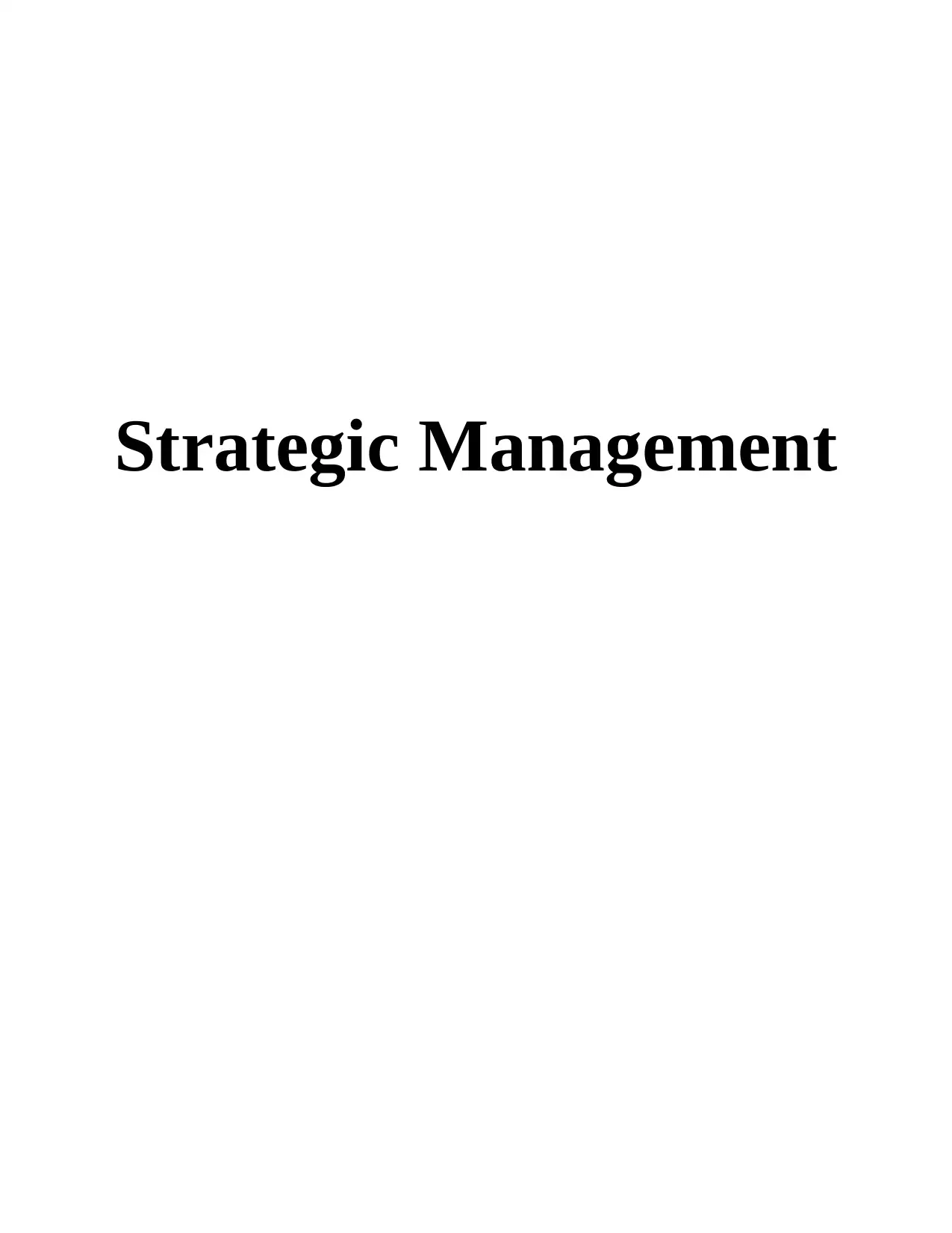
Strategic Management
Secure Best Marks with AI Grader
Need help grading? Try our AI Grader for instant feedback on your assignments.
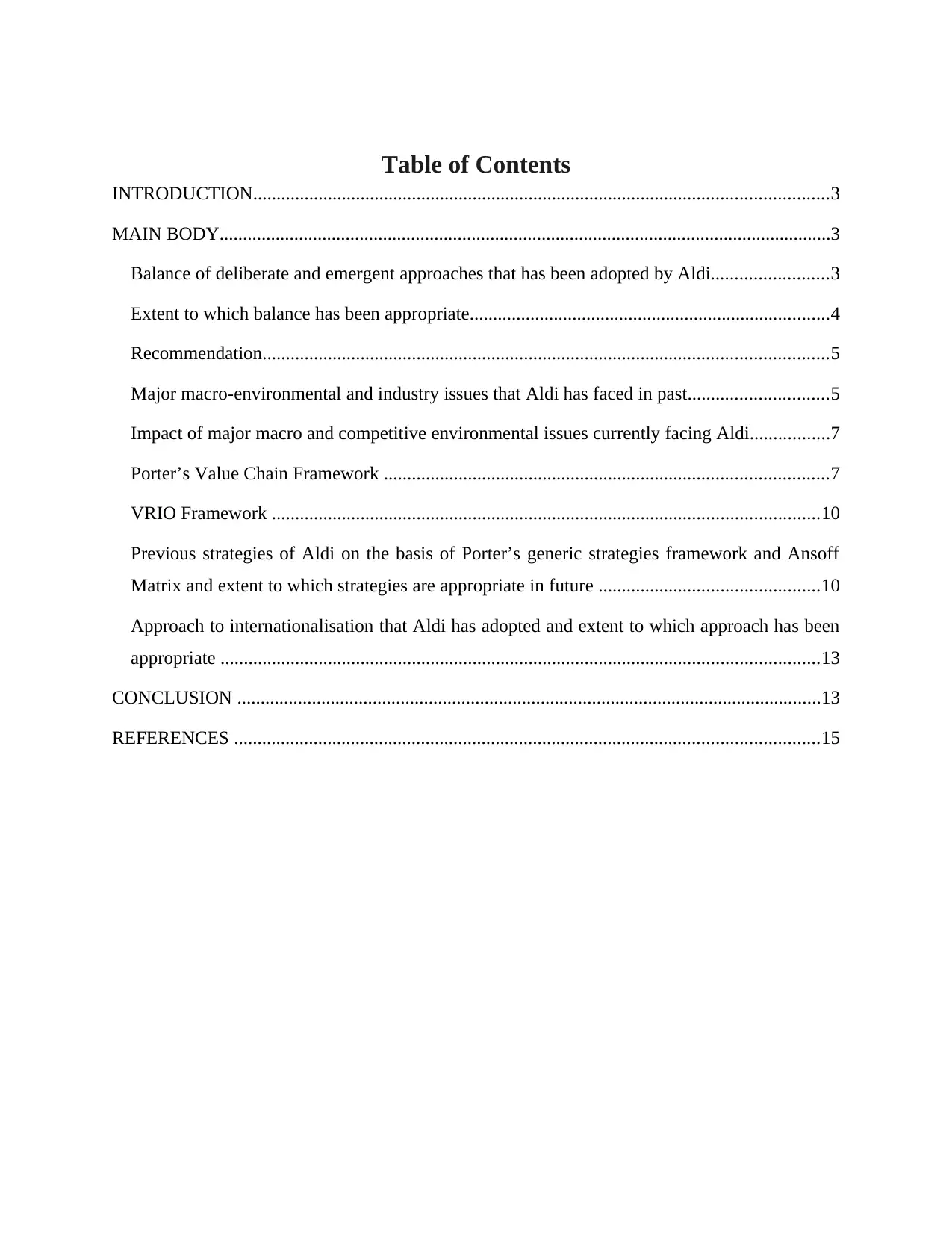
Table of Contents
INTRODUCTION...........................................................................................................................3
MAIN BODY...................................................................................................................................3
Balance of deliberate and emergent approaches that has been adopted by Aldi.........................3
Extent to which balance has been appropriate.............................................................................4
Recommendation.........................................................................................................................5
Major macro-environmental and industry issues that Aldi has faced in past..............................5
Impact of major macro and competitive environmental issues currently facing Aldi.................7
Porter’s Value Chain Framework ...............................................................................................7
VRIO Framework .....................................................................................................................10
Previous strategies of Aldi on the basis of Porter’s generic strategies framework and Ansoff
Matrix and extent to which strategies are appropriate in future ...............................................10
Approach to internationalisation that Aldi has adopted and extent to which approach has been
appropriate ................................................................................................................................13
CONCLUSION .............................................................................................................................13
REFERENCES .............................................................................................................................15
INTRODUCTION...........................................................................................................................3
MAIN BODY...................................................................................................................................3
Balance of deliberate and emergent approaches that has been adopted by Aldi.........................3
Extent to which balance has been appropriate.............................................................................4
Recommendation.........................................................................................................................5
Major macro-environmental and industry issues that Aldi has faced in past..............................5
Impact of major macro and competitive environmental issues currently facing Aldi.................7
Porter’s Value Chain Framework ...............................................................................................7
VRIO Framework .....................................................................................................................10
Previous strategies of Aldi on the basis of Porter’s generic strategies framework and Ansoff
Matrix and extent to which strategies are appropriate in future ...............................................10
Approach to internationalisation that Aldi has adopted and extent to which approach has been
appropriate ................................................................................................................................13
CONCLUSION .............................................................................................................................13
REFERENCES .............................................................................................................................15
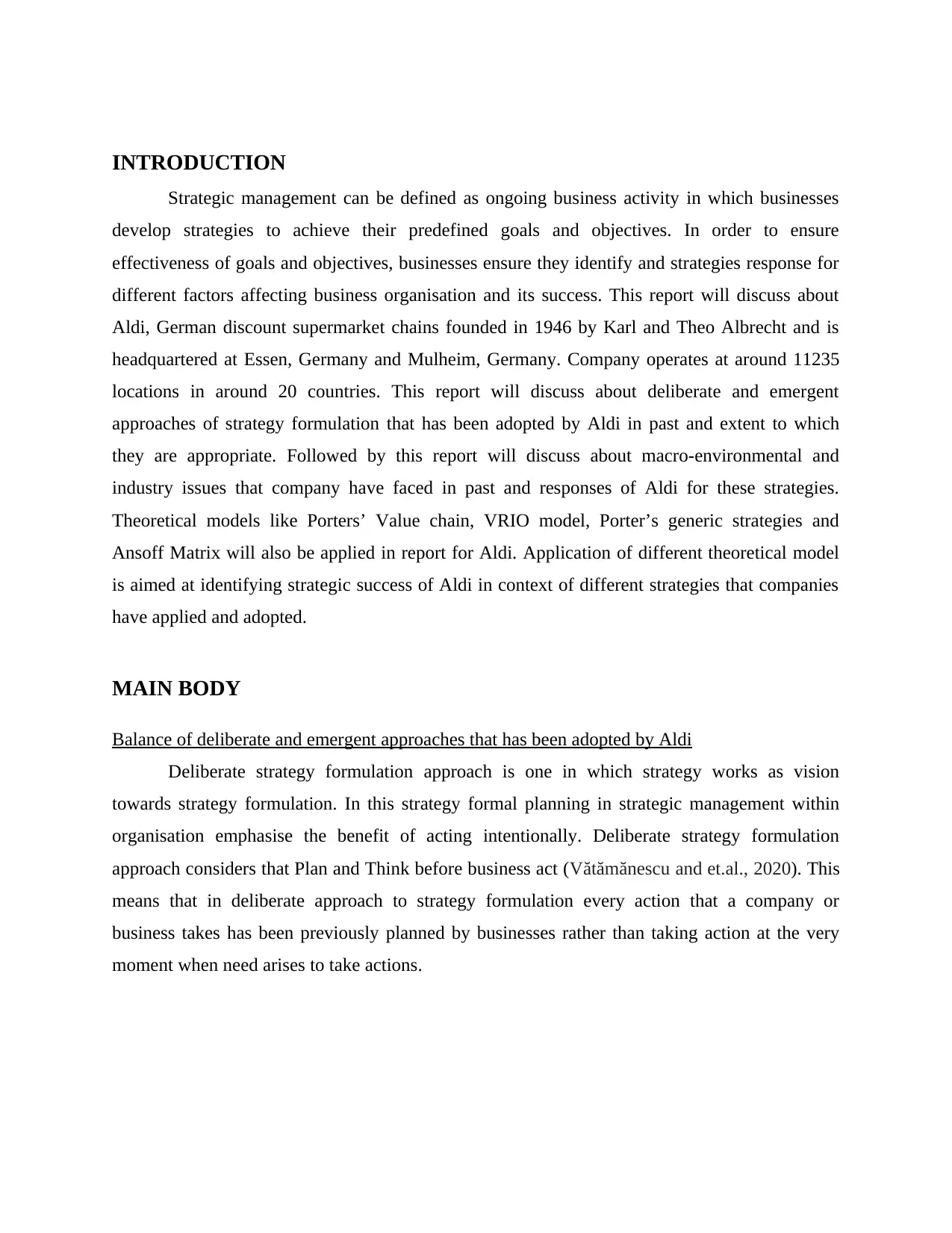
INTRODUCTION
Strategic management can be defined as ongoing business activity in which businesses
develop strategies to achieve their predefined goals and objectives. In order to ensure
effectiveness of goals and objectives, businesses ensure they identify and strategies response for
different factors affecting business organisation and its success. This report will discuss about
Aldi, German discount supermarket chains founded in 1946 by Karl and Theo Albrecht and is
headquartered at Essen, Germany and Mulheim, Germany. Company operates at around 11235
locations in around 20 countries. This report will discuss about deliberate and emergent
approaches of strategy formulation that has been adopted by Aldi in past and extent to which
they are appropriate. Followed by this report will discuss about macro-environmental and
industry issues that company have faced in past and responses of Aldi for these strategies.
Theoretical models like Porters’ Value chain, VRIO model, Porter’s generic strategies and
Ansoff Matrix will also be applied in report for Aldi. Application of different theoretical model
is aimed at identifying strategic success of Aldi in context of different strategies that companies
have applied and adopted.
MAIN BODY
Balance of deliberate and emergent approaches that has been adopted by Aldi
Deliberate strategy formulation approach is one in which strategy works as vision
towards strategy formulation. In this strategy formal planning in strategic management within
organisation emphasise the benefit of acting intentionally. Deliberate strategy formulation
approach considers that Plan and Think before business act (Vătămănescu and et.al., 2020). This
means that in deliberate approach to strategy formulation every action that a company or
business takes has been previously planned by businesses rather than taking action at the very
moment when need arises to take actions.
Strategic management can be defined as ongoing business activity in which businesses
develop strategies to achieve their predefined goals and objectives. In order to ensure
effectiveness of goals and objectives, businesses ensure they identify and strategies response for
different factors affecting business organisation and its success. This report will discuss about
Aldi, German discount supermarket chains founded in 1946 by Karl and Theo Albrecht and is
headquartered at Essen, Germany and Mulheim, Germany. Company operates at around 11235
locations in around 20 countries. This report will discuss about deliberate and emergent
approaches of strategy formulation that has been adopted by Aldi in past and extent to which
they are appropriate. Followed by this report will discuss about macro-environmental and
industry issues that company have faced in past and responses of Aldi for these strategies.
Theoretical models like Porters’ Value chain, VRIO model, Porter’s generic strategies and
Ansoff Matrix will also be applied in report for Aldi. Application of different theoretical model
is aimed at identifying strategic success of Aldi in context of different strategies that companies
have applied and adopted.
MAIN BODY
Balance of deliberate and emergent approaches that has been adopted by Aldi
Deliberate strategy formulation approach is one in which strategy works as vision
towards strategy formulation. In this strategy formal planning in strategic management within
organisation emphasise the benefit of acting intentionally. Deliberate strategy formulation
approach considers that Plan and Think before business act (Vătămănescu and et.al., 2020). This
means that in deliberate approach to strategy formulation every action that a company or
business takes has been previously planned by businesses rather than taking action at the very
moment when need arises to take actions.
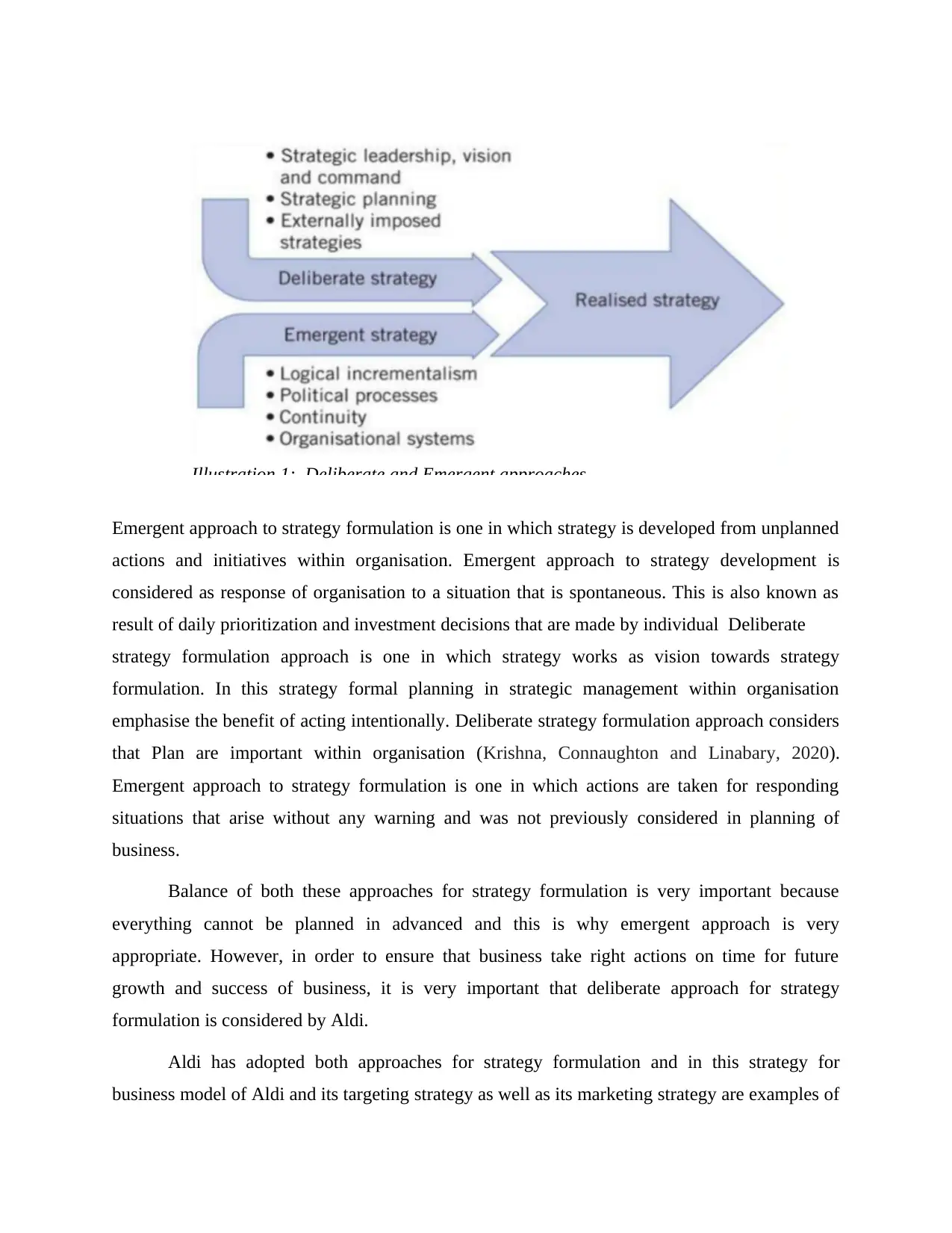
Emergent approach to strategy formulation is one in which strategy is developed from unplanned
actions and initiatives within organisation. Emergent approach to strategy development is
considered as response of organisation to a situation that is spontaneous. This is also known as
result of daily prioritization and investment decisions that are made by individual Deliberate
strategy formulation approach is one in which strategy works as vision towards strategy
formulation. In this strategy formal planning in strategic management within organisation
emphasise the benefit of acting intentionally. Deliberate strategy formulation approach considers
that Plan are important within organisation (Krishna, Connaughton and Linabary, 2020).
Emergent approach to strategy formulation is one in which actions are taken for responding
situations that arise without any warning and was not previously considered in planning of
business.
Balance of both these approaches for strategy formulation is very important because
everything cannot be planned in advanced and this is why emergent approach is very
appropriate. However, in order to ensure that business take right actions on time for future
growth and success of business, it is very important that deliberate approach for strategy
formulation is considered by Aldi.
Aldi has adopted both approaches for strategy formulation and in this strategy for
business model of Aldi and its targeting strategy as well as its marketing strategy are examples of
Illustration 1: Deliberate and Emergent approaches
actions and initiatives within organisation. Emergent approach to strategy development is
considered as response of organisation to a situation that is spontaneous. This is also known as
result of daily prioritization and investment decisions that are made by individual Deliberate
strategy formulation approach is one in which strategy works as vision towards strategy
formulation. In this strategy formal planning in strategic management within organisation
emphasise the benefit of acting intentionally. Deliberate strategy formulation approach considers
that Plan are important within organisation (Krishna, Connaughton and Linabary, 2020).
Emergent approach to strategy formulation is one in which actions are taken for responding
situations that arise without any warning and was not previously considered in planning of
business.
Balance of both these approaches for strategy formulation is very important because
everything cannot be planned in advanced and this is why emergent approach is very
appropriate. However, in order to ensure that business take right actions on time for future
growth and success of business, it is very important that deliberate approach for strategy
formulation is considered by Aldi.
Aldi has adopted both approaches for strategy formulation and in this strategy for
business model of Aldi and its targeting strategy as well as its marketing strategy are examples of
Illustration 1: Deliberate and Emergent approaches
Secure Best Marks with AI Grader
Need help grading? Try our AI Grader for instant feedback on your assignments.
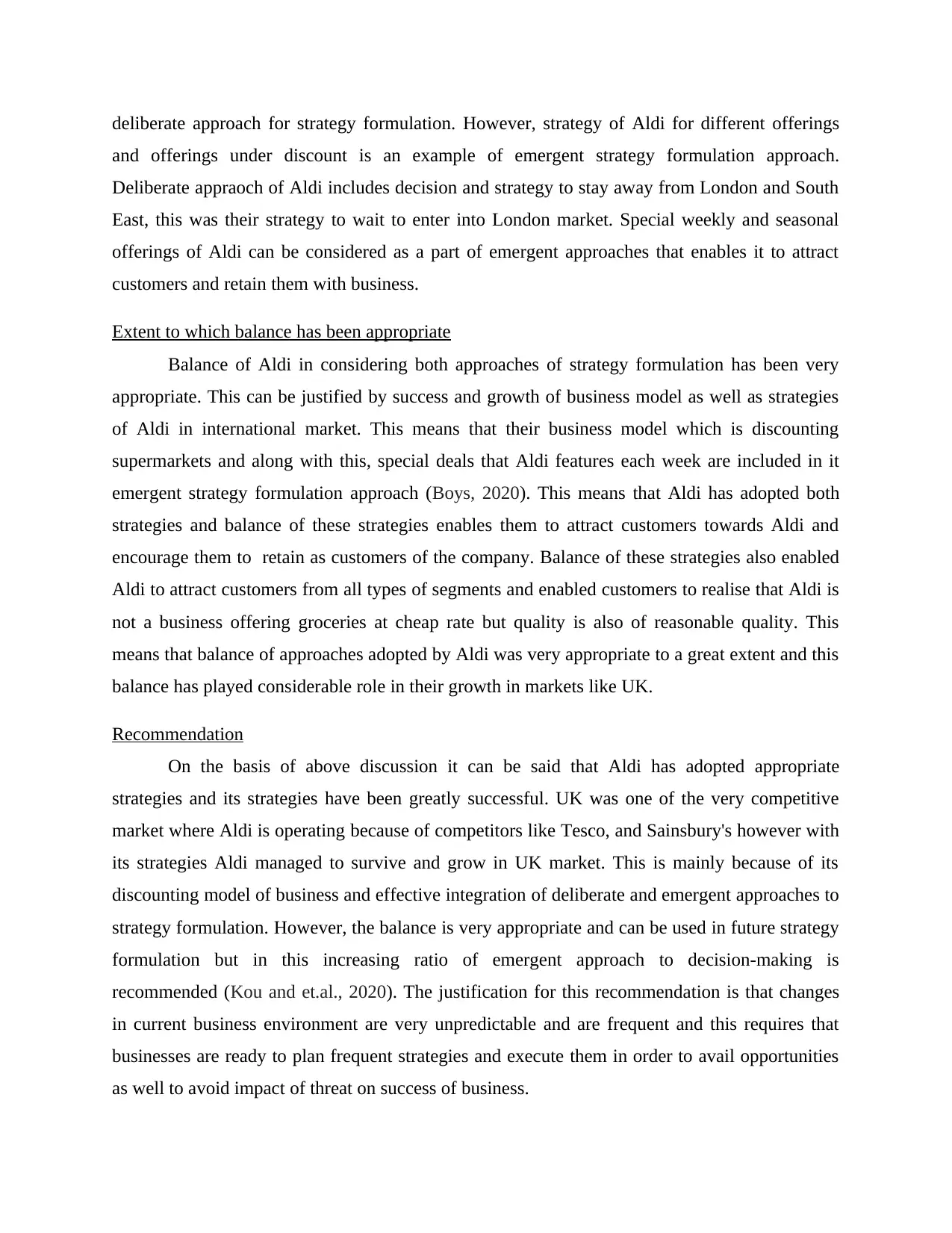
deliberate approach for strategy formulation. However, strategy of Aldi for different offerings
and offerings under discount is an example of emergent strategy formulation approach.
Deliberate appraoch of Aldi includes decision and strategy to stay away from London and South
East, this was their strategy to wait to enter into London market. Special weekly and seasonal
offerings of Aldi can be considered as a part of emergent approaches that enables it to attract
customers and retain them with business.
Extent to which balance has been appropriate
Balance of Aldi in considering both approaches of strategy formulation has been very
appropriate. This can be justified by success and growth of business model as well as strategies
of Aldi in international market. This means that their business model which is discounting
supermarkets and along with this, special deals that Aldi features each week are included in it
emergent strategy formulation approach (Boys, 2020). This means that Aldi has adopted both
strategies and balance of these strategies enables them to attract customers towards Aldi and
encourage them to retain as customers of the company. Balance of these strategies also enabled
Aldi to attract customers from all types of segments and enabled customers to realise that Aldi is
not a business offering groceries at cheap rate but quality is also of reasonable quality. This
means that balance of approaches adopted by Aldi was very appropriate to a great extent and this
balance has played considerable role in their growth in markets like UK.
Recommendation
On the basis of above discussion it can be said that Aldi has adopted appropriate
strategies and its strategies have been greatly successful. UK was one of the very competitive
market where Aldi is operating because of competitors like Tesco, and Sainsbury's however with
its strategies Aldi managed to survive and grow in UK market. This is mainly because of its
discounting model of business and effective integration of deliberate and emergent approaches to
strategy formulation. However, the balance is very appropriate and can be used in future strategy
formulation but in this increasing ratio of emergent approach to decision-making is
recommended (Kou and et.al., 2020). The justification for this recommendation is that changes
in current business environment are very unpredictable and are frequent and this requires that
businesses are ready to plan frequent strategies and execute them in order to avail opportunities
as well to avoid impact of threat on success of business.
and offerings under discount is an example of emergent strategy formulation approach.
Deliberate appraoch of Aldi includes decision and strategy to stay away from London and South
East, this was their strategy to wait to enter into London market. Special weekly and seasonal
offerings of Aldi can be considered as a part of emergent approaches that enables it to attract
customers and retain them with business.
Extent to which balance has been appropriate
Balance of Aldi in considering both approaches of strategy formulation has been very
appropriate. This can be justified by success and growth of business model as well as strategies
of Aldi in international market. This means that their business model which is discounting
supermarkets and along with this, special deals that Aldi features each week are included in it
emergent strategy formulation approach (Boys, 2020). This means that Aldi has adopted both
strategies and balance of these strategies enables them to attract customers towards Aldi and
encourage them to retain as customers of the company. Balance of these strategies also enabled
Aldi to attract customers from all types of segments and enabled customers to realise that Aldi is
not a business offering groceries at cheap rate but quality is also of reasonable quality. This
means that balance of approaches adopted by Aldi was very appropriate to a great extent and this
balance has played considerable role in their growth in markets like UK.
Recommendation
On the basis of above discussion it can be said that Aldi has adopted appropriate
strategies and its strategies have been greatly successful. UK was one of the very competitive
market where Aldi is operating because of competitors like Tesco, and Sainsbury's however with
its strategies Aldi managed to survive and grow in UK market. This is mainly because of its
discounting model of business and effective integration of deliberate and emergent approaches to
strategy formulation. However, the balance is very appropriate and can be used in future strategy
formulation but in this increasing ratio of emergent approach to decision-making is
recommended (Kou and et.al., 2020). The justification for this recommendation is that changes
in current business environment are very unpredictable and are frequent and this requires that
businesses are ready to plan frequent strategies and execute them in order to avail opportunities
as well to avoid impact of threat on success of business.
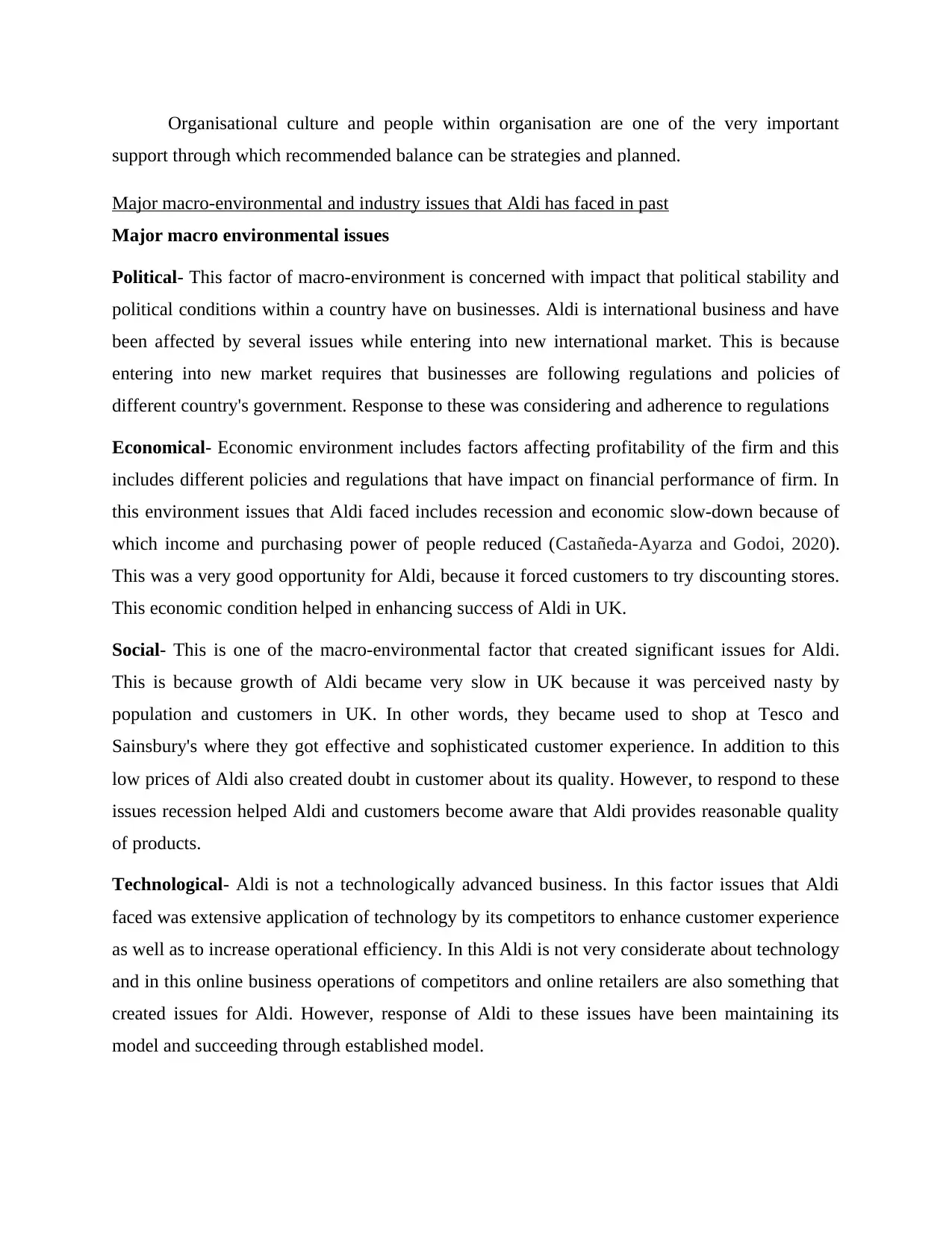
Organisational culture and people within organisation are one of the very important
support through which recommended balance can be strategies and planned.
Major macro-environmental and industry issues that Aldi has faced in past
Major macro environmental issues
Political- This factor of macro-environment is concerned with impact that political stability and
political conditions within a country have on businesses. Aldi is international business and have
been affected by several issues while entering into new international market. This is because
entering into new market requires that businesses are following regulations and policies of
different country's government. Response to these was considering and adherence to regulations
Economical- Economic environment includes factors affecting profitability of the firm and this
includes different policies and regulations that have impact on financial performance of firm. In
this environment issues that Aldi faced includes recession and economic slow-down because of
which income and purchasing power of people reduced (Castañeda-Ayarza and Godoi, 2020).
This was a very good opportunity for Aldi, because it forced customers to try discounting stores.
This economic condition helped in enhancing success of Aldi in UK.
Social- This is one of the macro-environmental factor that created significant issues for Aldi.
This is because growth of Aldi became very slow in UK because it was perceived nasty by
population and customers in UK. In other words, they became used to shop at Tesco and
Sainsbury's where they got effective and sophisticated customer experience. In addition to this
low prices of Aldi also created doubt in customer about its quality. However, to respond to these
issues recession helped Aldi and customers become aware that Aldi provides reasonable quality
of products.
Technological- Aldi is not a technologically advanced business. In this factor issues that Aldi
faced was extensive application of technology by its competitors to enhance customer experience
as well as to increase operational efficiency. In this Aldi is not very considerate about technology
and in this online business operations of competitors and online retailers are also something that
created issues for Aldi. However, response of Aldi to these issues have been maintaining its
model and succeeding through established model.
support through which recommended balance can be strategies and planned.
Major macro-environmental and industry issues that Aldi has faced in past
Major macro environmental issues
Political- This factor of macro-environment is concerned with impact that political stability and
political conditions within a country have on businesses. Aldi is international business and have
been affected by several issues while entering into new international market. This is because
entering into new market requires that businesses are following regulations and policies of
different country's government. Response to these was considering and adherence to regulations
Economical- Economic environment includes factors affecting profitability of the firm and this
includes different policies and regulations that have impact on financial performance of firm. In
this environment issues that Aldi faced includes recession and economic slow-down because of
which income and purchasing power of people reduced (Castañeda-Ayarza and Godoi, 2020).
This was a very good opportunity for Aldi, because it forced customers to try discounting stores.
This economic condition helped in enhancing success of Aldi in UK.
Social- This is one of the macro-environmental factor that created significant issues for Aldi.
This is because growth of Aldi became very slow in UK because it was perceived nasty by
population and customers in UK. In other words, they became used to shop at Tesco and
Sainsbury's where they got effective and sophisticated customer experience. In addition to this
low prices of Aldi also created doubt in customer about its quality. However, to respond to these
issues recession helped Aldi and customers become aware that Aldi provides reasonable quality
of products.
Technological- Aldi is not a technologically advanced business. In this factor issues that Aldi
faced was extensive application of technology by its competitors to enhance customer experience
as well as to increase operational efficiency. In this Aldi is not very considerate about technology
and in this online business operations of competitors and online retailers are also something that
created issues for Aldi. However, response of Aldi to these issues have been maintaining its
model and succeeding through established model.
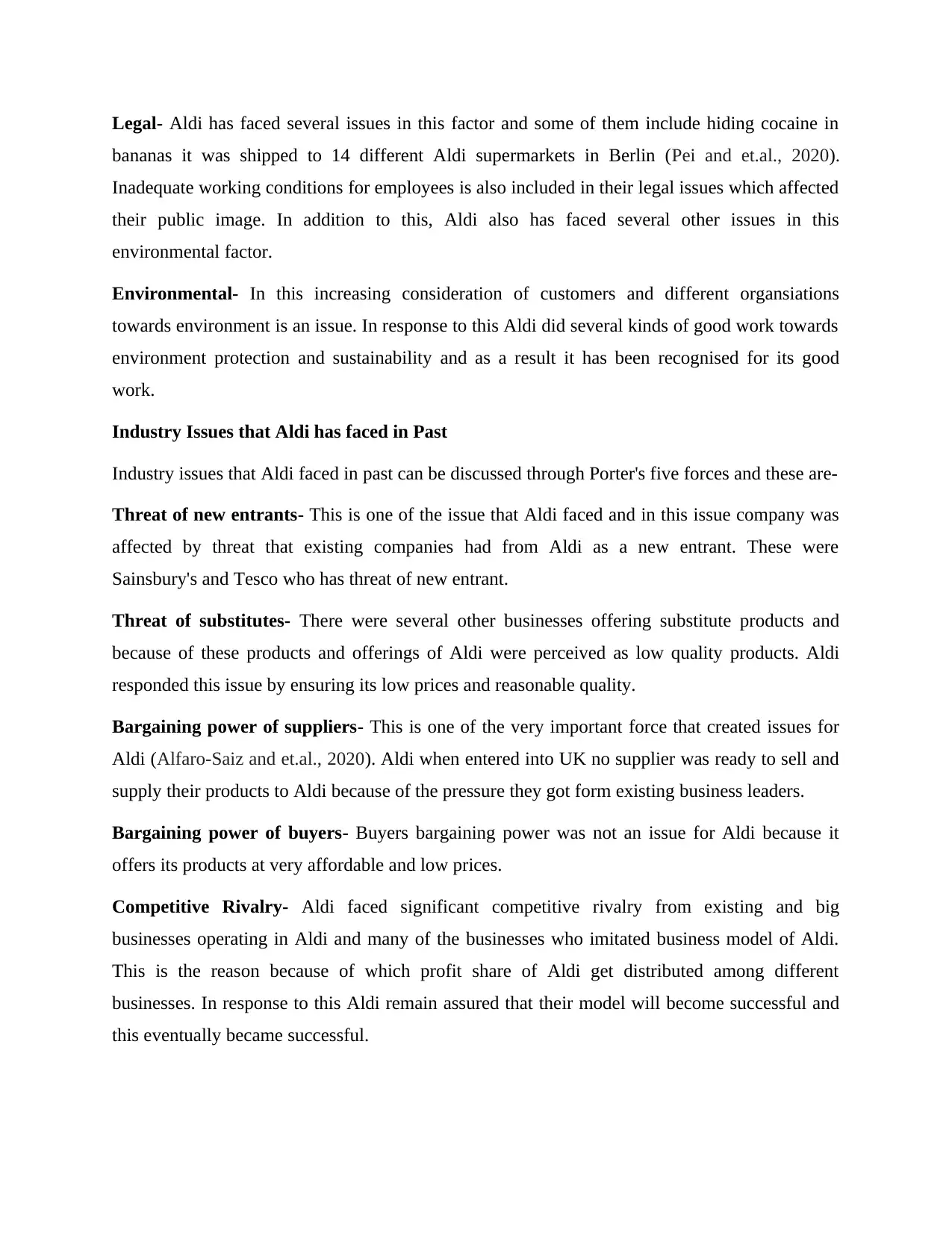
Legal- Aldi has faced several issues in this factor and some of them include hiding cocaine in
bananas it was shipped to 14 different Aldi supermarkets in Berlin (Pei and et.al., 2020).
Inadequate working conditions for employees is also included in their legal issues which affected
their public image. In addition to this, Aldi also has faced several other issues in this
environmental factor.
Environmental- In this increasing consideration of customers and different organsiations
towards environment is an issue. In response to this Aldi did several kinds of good work towards
environment protection and sustainability and as a result it has been recognised for its good
work.
Industry Issues that Aldi has faced in Past
Industry issues that Aldi faced in past can be discussed through Porter's five forces and these are-
Threat of new entrants- This is one of the issue that Aldi faced and in this issue company was
affected by threat that existing companies had from Aldi as a new entrant. These were
Sainsbury's and Tesco who has threat of new entrant.
Threat of substitutes- There were several other businesses offering substitute products and
because of these products and offerings of Aldi were perceived as low quality products. Aldi
responded this issue by ensuring its low prices and reasonable quality.
Bargaining power of suppliers- This is one of the very important force that created issues for
Aldi (Alfaro-Saiz and et.al., 2020). Aldi when entered into UK no supplier was ready to sell and
supply their products to Aldi because of the pressure they got form existing business leaders.
Bargaining power of buyers- Buyers bargaining power was not an issue for Aldi because it
offers its products at very affordable and low prices.
Competitive Rivalry- Aldi faced significant competitive rivalry from existing and big
businesses operating in Aldi and many of the businesses who imitated business model of Aldi.
This is the reason because of which profit share of Aldi get distributed among different
businesses. In response to this Aldi remain assured that their model will become successful and
this eventually became successful.
bananas it was shipped to 14 different Aldi supermarkets in Berlin (Pei and et.al., 2020).
Inadequate working conditions for employees is also included in their legal issues which affected
their public image. In addition to this, Aldi also has faced several other issues in this
environmental factor.
Environmental- In this increasing consideration of customers and different organsiations
towards environment is an issue. In response to this Aldi did several kinds of good work towards
environment protection and sustainability and as a result it has been recognised for its good
work.
Industry Issues that Aldi has faced in Past
Industry issues that Aldi faced in past can be discussed through Porter's five forces and these are-
Threat of new entrants- This is one of the issue that Aldi faced and in this issue company was
affected by threat that existing companies had from Aldi as a new entrant. These were
Sainsbury's and Tesco who has threat of new entrant.
Threat of substitutes- There were several other businesses offering substitute products and
because of these products and offerings of Aldi were perceived as low quality products. Aldi
responded this issue by ensuring its low prices and reasonable quality.
Bargaining power of suppliers- This is one of the very important force that created issues for
Aldi (Alfaro-Saiz and et.al., 2020). Aldi when entered into UK no supplier was ready to sell and
supply their products to Aldi because of the pressure they got form existing business leaders.
Bargaining power of buyers- Buyers bargaining power was not an issue for Aldi because it
offers its products at very affordable and low prices.
Competitive Rivalry- Aldi faced significant competitive rivalry from existing and big
businesses operating in Aldi and many of the businesses who imitated business model of Aldi.
This is the reason because of which profit share of Aldi get distributed among different
businesses. In response to this Aldi remain assured that their model will become successful and
this eventually became successful.
Paraphrase This Document
Need a fresh take? Get an instant paraphrase of this document with our AI Paraphraser
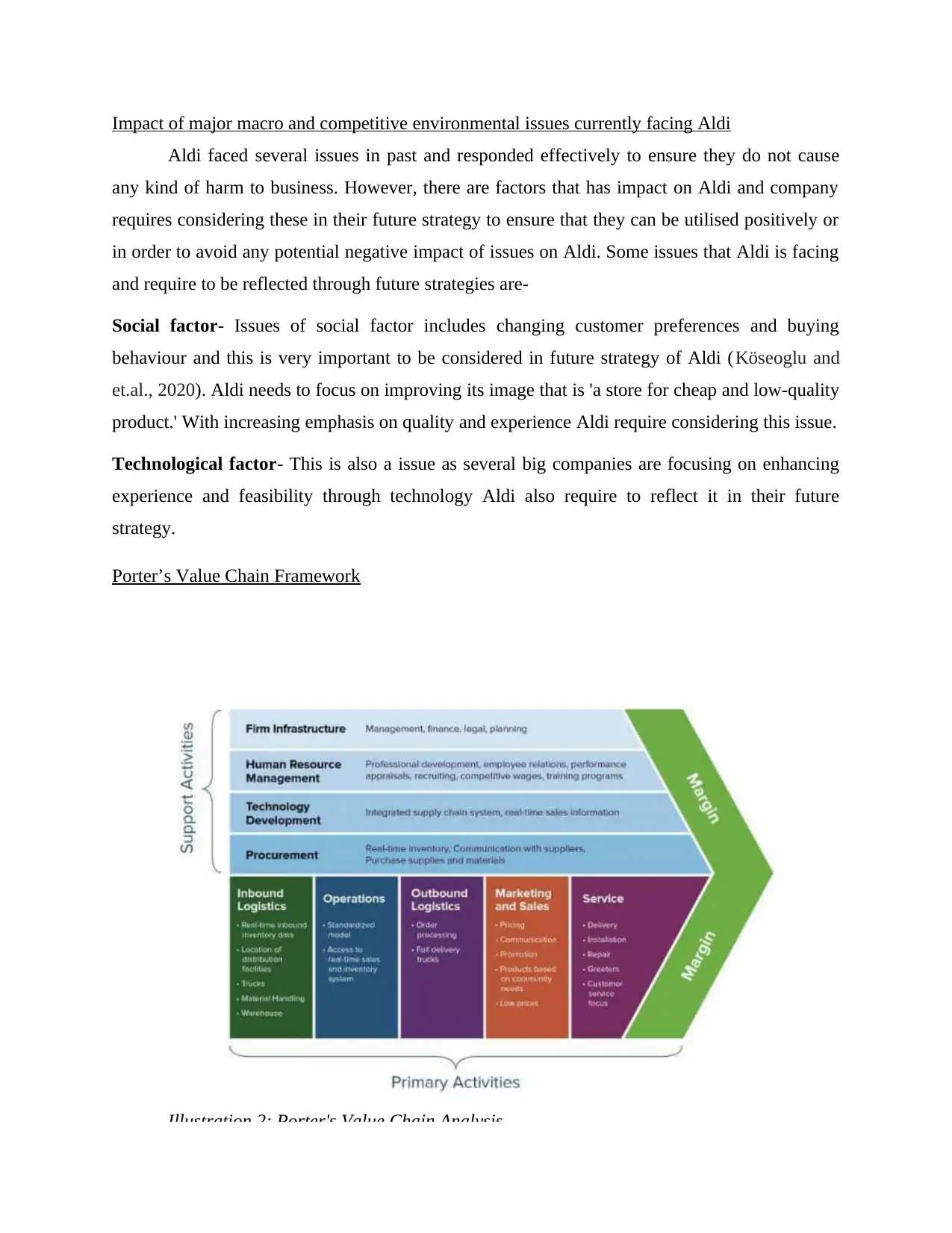
Impact of major macro and competitive environmental issues currently facing Aldi
Aldi faced several issues in past and responded effectively to ensure they do not cause
any kind of harm to business. However, there are factors that has impact on Aldi and company
requires considering these in their future strategy to ensure that they can be utilised positively or
in order to avoid any potential negative impact of issues on Aldi. Some issues that Aldi is facing
and require to be reflected through future strategies are-
Social factor- Issues of social factor includes changing customer preferences and buying
behaviour and this is very important to be considered in future strategy of Aldi (Köseoglu and
et.al., 2020). Aldi needs to focus on improving its image that is 'a store for cheap and low-quality
product.' With increasing emphasis on quality and experience Aldi require considering this issue.
Technological factor- This is also a issue as several big companies are focusing on enhancing
experience and feasibility through technology Aldi also require to reflect it in their future
strategy.
Porter’s Value Chain Framework
Illustration 2: Porter's Value Chain Analysis
Aldi faced several issues in past and responded effectively to ensure they do not cause
any kind of harm to business. However, there are factors that has impact on Aldi and company
requires considering these in their future strategy to ensure that they can be utilised positively or
in order to avoid any potential negative impact of issues on Aldi. Some issues that Aldi is facing
and require to be reflected through future strategies are-
Social factor- Issues of social factor includes changing customer preferences and buying
behaviour and this is very important to be considered in future strategy of Aldi (Köseoglu and
et.al., 2020). Aldi needs to focus on improving its image that is 'a store for cheap and low-quality
product.' With increasing emphasis on quality and experience Aldi require considering this issue.
Technological factor- This is also a issue as several big companies are focusing on enhancing
experience and feasibility through technology Aldi also require to reflect it in their future
strategy.
Porter’s Value Chain Framework
Illustration 2: Porter's Value Chain Analysis
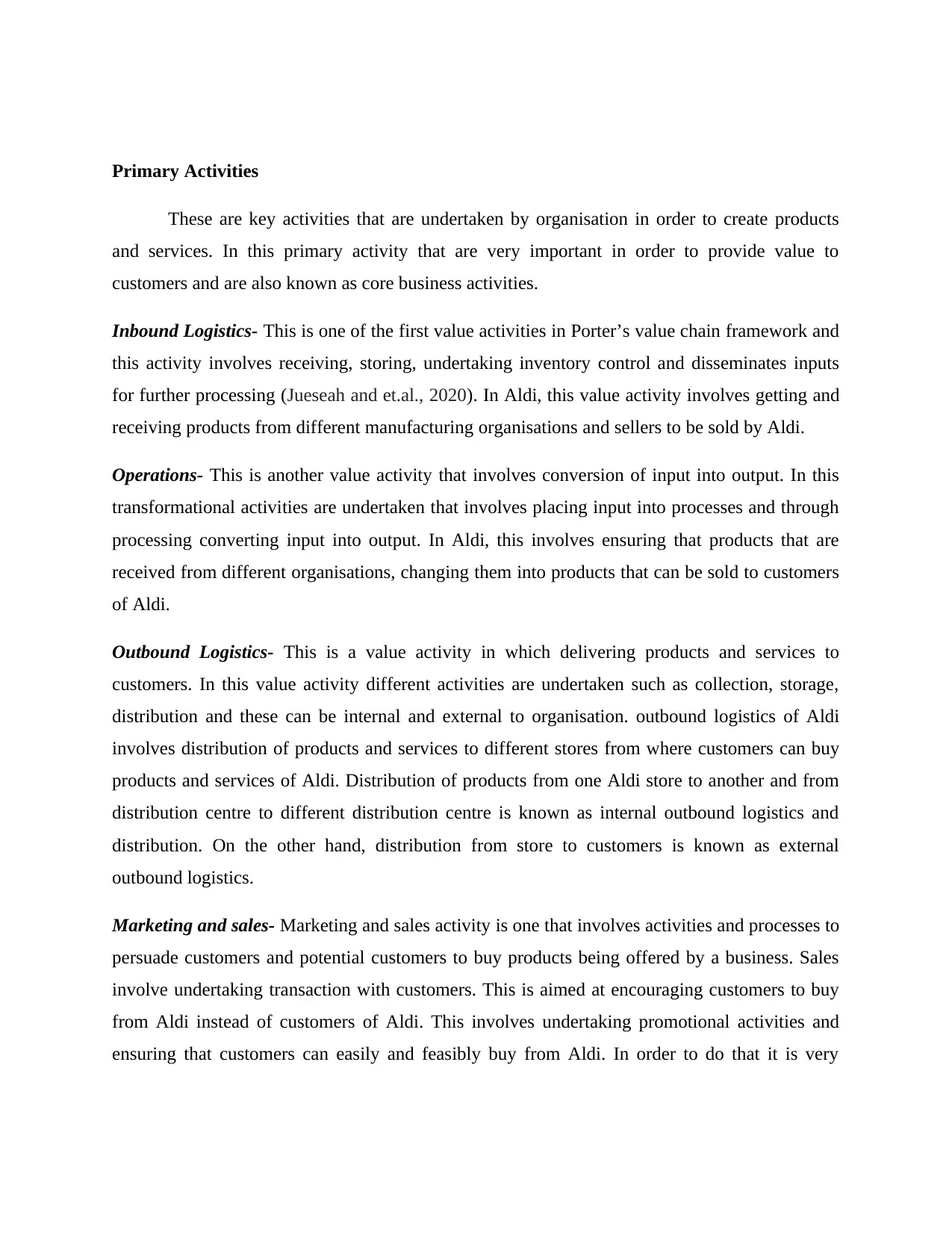
Primary Activities
These are key activities that are undertaken by organisation in order to create products
and services. In this primary activity that are very important in order to provide value to
customers and are also known as core business activities.
Inbound Logistics- This is one of the first value activities in Porter’s value chain framework and
this activity involves receiving, storing, undertaking inventory control and disseminates inputs
for further processing (Jueseah and et.al., 2020). In Aldi, this value activity involves getting and
receiving products from different manufacturing organisations and sellers to be sold by Aldi.
Operations- This is another value activity that involves conversion of input into output. In this
transformational activities are undertaken that involves placing input into processes and through
processing converting input into output. In Aldi, this involves ensuring that products that are
received from different organisations, changing them into products that can be sold to customers
of Aldi.
Outbound Logistics- This is a value activity in which delivering products and services to
customers. In this value activity different activities are undertaken such as collection, storage,
distribution and these can be internal and external to organisation. outbound logistics of Aldi
involves distribution of products and services to different stores from where customers can buy
products and services of Aldi. Distribution of products from one Aldi store to another and from
distribution centre to different distribution centre is known as internal outbound logistics and
distribution. On the other hand, distribution from store to customers is known as external
outbound logistics.
Marketing and sales- Marketing and sales activity is one that involves activities and processes to
persuade customers and potential customers to buy products being offered by a business. Sales
involve undertaking transaction with customers. This is aimed at encouraging customers to buy
from Aldi instead of customers of Aldi. This involves undertaking promotional activities and
ensuring that customers can easily and feasibly buy from Aldi. In order to do that it is very
These are key activities that are undertaken by organisation in order to create products
and services. In this primary activity that are very important in order to provide value to
customers and are also known as core business activities.
Inbound Logistics- This is one of the first value activities in Porter’s value chain framework and
this activity involves receiving, storing, undertaking inventory control and disseminates inputs
for further processing (Jueseah and et.al., 2020). In Aldi, this value activity involves getting and
receiving products from different manufacturing organisations and sellers to be sold by Aldi.
Operations- This is another value activity that involves conversion of input into output. In this
transformational activities are undertaken that involves placing input into processes and through
processing converting input into output. In Aldi, this involves ensuring that products that are
received from different organisations, changing them into products that can be sold to customers
of Aldi.
Outbound Logistics- This is a value activity in which delivering products and services to
customers. In this value activity different activities are undertaken such as collection, storage,
distribution and these can be internal and external to organisation. outbound logistics of Aldi
involves distribution of products and services to different stores from where customers can buy
products and services of Aldi. Distribution of products from one Aldi store to another and from
distribution centre to different distribution centre is known as internal outbound logistics and
distribution. On the other hand, distribution from store to customers is known as external
outbound logistics.
Marketing and sales- Marketing and sales activity is one that involves activities and processes to
persuade customers and potential customers to buy products being offered by a business. Sales
involve undertaking transaction with customers. This is aimed at encouraging customers to buy
from Aldi instead of customers of Aldi. This involves undertaking promotional activities and
ensuring that customers can easily and feasibly buy from Aldi. In order to do that it is very
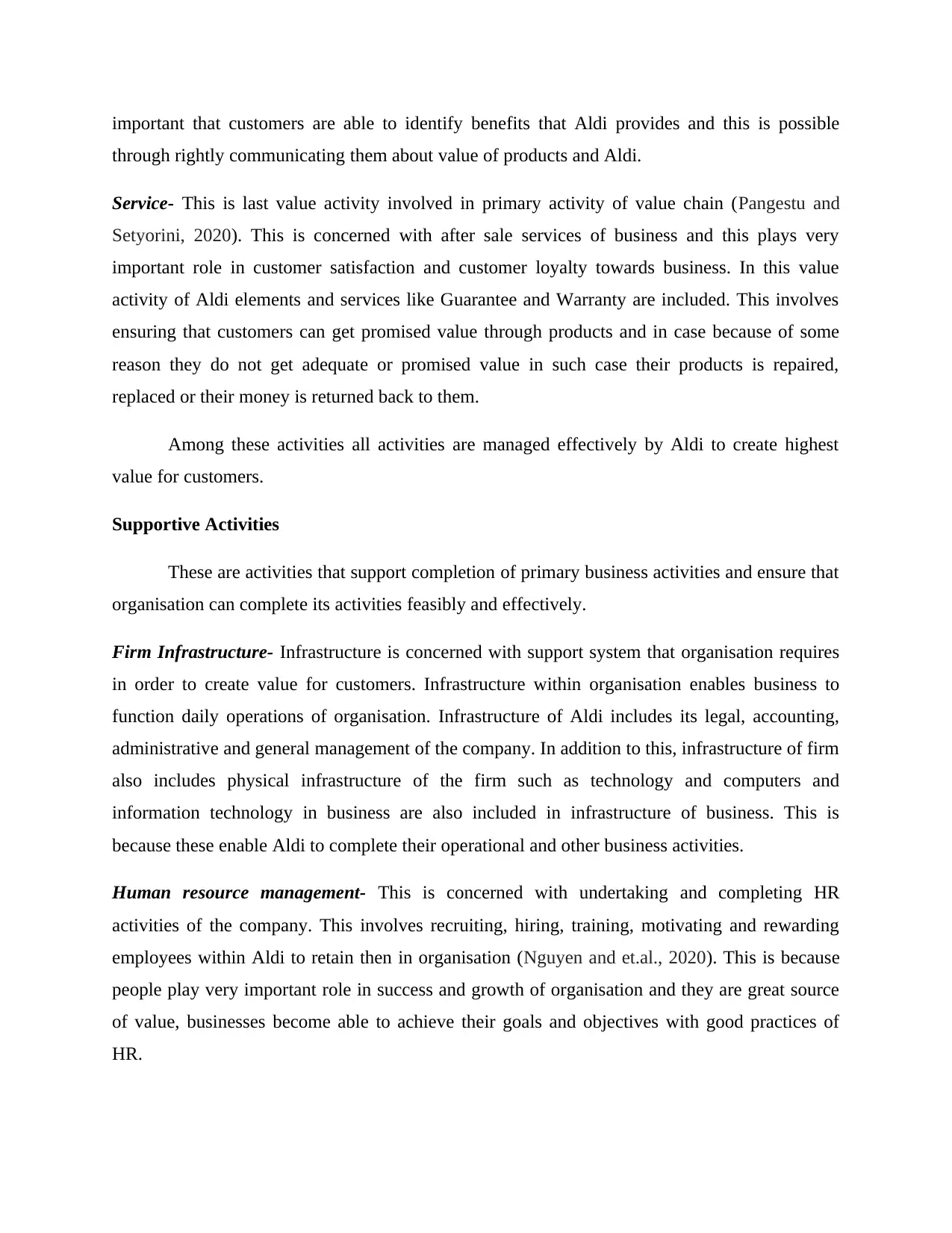
important that customers are able to identify benefits that Aldi provides and this is possible
through rightly communicating them about value of products and Aldi.
Service- This is last value activity involved in primary activity of value chain (Pangestu and
Setyorini, 2020). This is concerned with after sale services of business and this plays very
important role in customer satisfaction and customer loyalty towards business. In this value
activity of Aldi elements and services like Guarantee and Warranty are included. This involves
ensuring that customers can get promised value through products and in case because of some
reason they do not get adequate or promised value in such case their products is repaired,
replaced or their money is returned back to them.
Among these activities all activities are managed effectively by Aldi to create highest
value for customers.
Supportive Activities
These are activities that support completion of primary business activities and ensure that
organisation can complete its activities feasibly and effectively.
Firm Infrastructure- Infrastructure is concerned with support system that organisation requires
in order to create value for customers. Infrastructure within organisation enables business to
function daily operations of organisation. Infrastructure of Aldi includes its legal, accounting,
administrative and general management of the company. In addition to this, infrastructure of firm
also includes physical infrastructure of the firm such as technology and computers and
information technology in business are also included in infrastructure of business. This is
because these enable Aldi to complete their operational and other business activities.
Human resource management- This is concerned with undertaking and completing HR
activities of the company. This involves recruiting, hiring, training, motivating and rewarding
employees within Aldi to retain then in organisation (Nguyen and et.al., 2020). This is because
people play very important role in success and growth of organisation and they are great source
of value, businesses become able to achieve their goals and objectives with good practices of
HR.
through rightly communicating them about value of products and Aldi.
Service- This is last value activity involved in primary activity of value chain (Pangestu and
Setyorini, 2020). This is concerned with after sale services of business and this plays very
important role in customer satisfaction and customer loyalty towards business. In this value
activity of Aldi elements and services like Guarantee and Warranty are included. This involves
ensuring that customers can get promised value through products and in case because of some
reason they do not get adequate or promised value in such case their products is repaired,
replaced or their money is returned back to them.
Among these activities all activities are managed effectively by Aldi to create highest
value for customers.
Supportive Activities
These are activities that support completion of primary business activities and ensure that
organisation can complete its activities feasibly and effectively.
Firm Infrastructure- Infrastructure is concerned with support system that organisation requires
in order to create value for customers. Infrastructure within organisation enables business to
function daily operations of organisation. Infrastructure of Aldi includes its legal, accounting,
administrative and general management of the company. In addition to this, infrastructure of firm
also includes physical infrastructure of the firm such as technology and computers and
information technology in business are also included in infrastructure of business. This is
because these enable Aldi to complete their operational and other business activities.
Human resource management- This is concerned with undertaking and completing HR
activities of the company. This involves recruiting, hiring, training, motivating and rewarding
employees within Aldi to retain then in organisation (Nguyen and et.al., 2020). This is because
people play very important role in success and growth of organisation and they are great source
of value, businesses become able to achieve their goals and objectives with good practices of
HR.
Secure Best Marks with AI Grader
Need help grading? Try our AI Grader for instant feedback on your assignments.
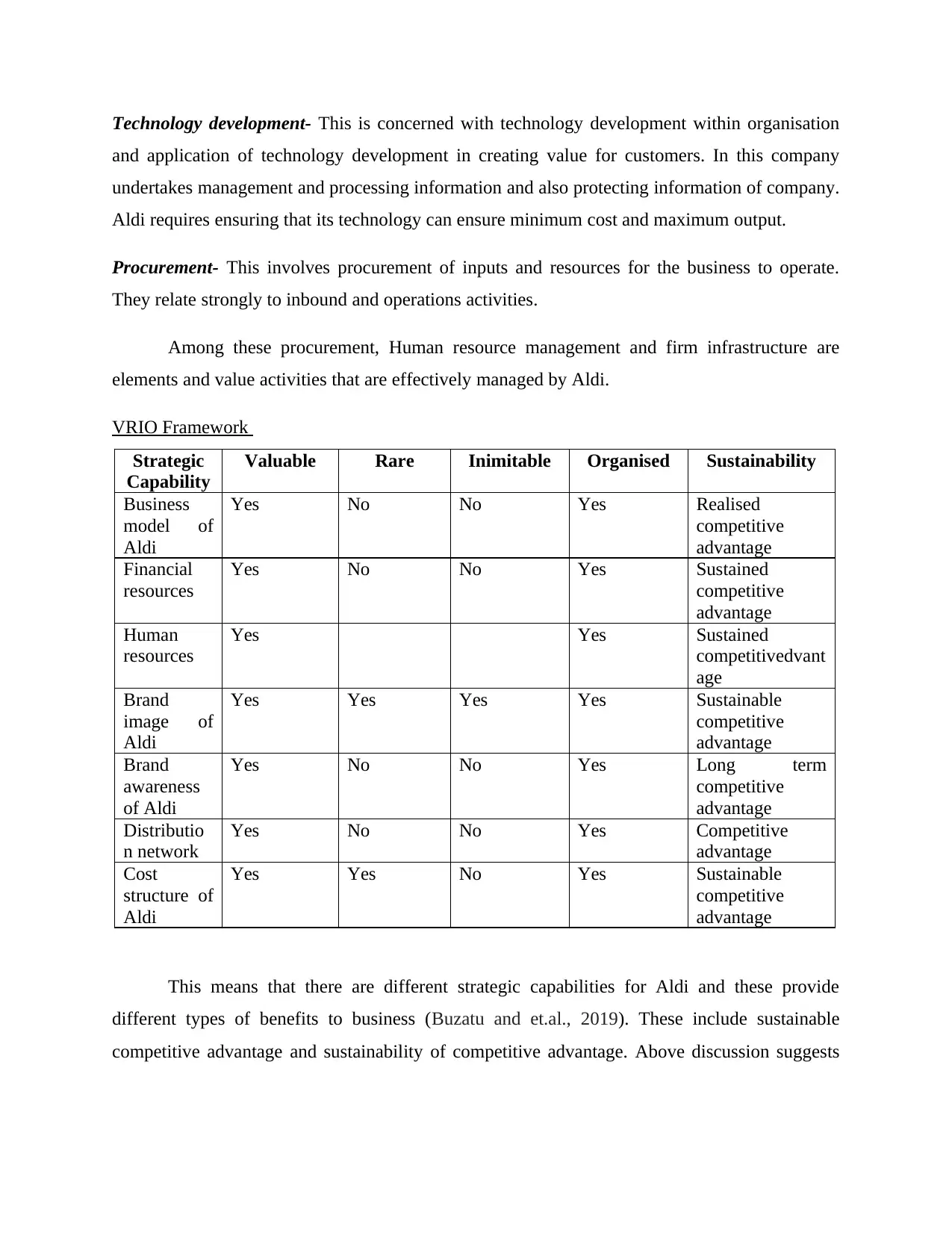
Technology development- This is concerned with technology development within organisation
and application of technology development in creating value for customers. In this company
undertakes management and processing information and also protecting information of company.
Aldi requires ensuring that its technology can ensure minimum cost and maximum output.
Procurement- This involves procurement of inputs and resources for the business to operate.
They relate strongly to inbound and operations activities.
Among these procurement, Human resource management and firm infrastructure are
elements and value activities that are effectively managed by Aldi.
VRIO Framework
Strategic
Capability
Valuable Rare Inimitable Organised Sustainability
Business
model of
Aldi
Yes No No Yes Realised
competitive
advantage
Financial
resources
Yes No No Yes Sustained
competitive
advantage
Human
resources
Yes Yes Sustained
competitivedvant
age
Brand
image of
Aldi
Yes Yes Yes Yes Sustainable
competitive
advantage
Brand
awareness
of Aldi
Yes No No Yes Long term
competitive
advantage
Distributio
n network
Yes No No Yes Competitive
advantage
Cost
structure of
Aldi
Yes Yes No Yes Sustainable
competitive
advantage
This means that there are different strategic capabilities for Aldi and these provide
different types of benefits to business (Buzatu and et.al., 2019). These include sustainable
competitive advantage and sustainability of competitive advantage. Above discussion suggests
and application of technology development in creating value for customers. In this company
undertakes management and processing information and also protecting information of company.
Aldi requires ensuring that its technology can ensure minimum cost and maximum output.
Procurement- This involves procurement of inputs and resources for the business to operate.
They relate strongly to inbound and operations activities.
Among these procurement, Human resource management and firm infrastructure are
elements and value activities that are effectively managed by Aldi.
VRIO Framework
Strategic
Capability
Valuable Rare Inimitable Organised Sustainability
Business
model of
Aldi
Yes No No Yes Realised
competitive
advantage
Financial
resources
Yes No No Yes Sustained
competitive
advantage
Human
resources
Yes Yes Sustained
competitivedvant
age
Brand
image of
Aldi
Yes Yes Yes Yes Sustainable
competitive
advantage
Brand
awareness
of Aldi
Yes No No Yes Long term
competitive
advantage
Distributio
n network
Yes No No Yes Competitive
advantage
Cost
structure of
Aldi
Yes Yes No Yes Sustainable
competitive
advantage
This means that there are different strategic capabilities for Aldi and these provide
different types of benefits to business (Buzatu and et.al., 2019). These include sustainable
competitive advantage and sustainability of competitive advantage. Above discussion suggests
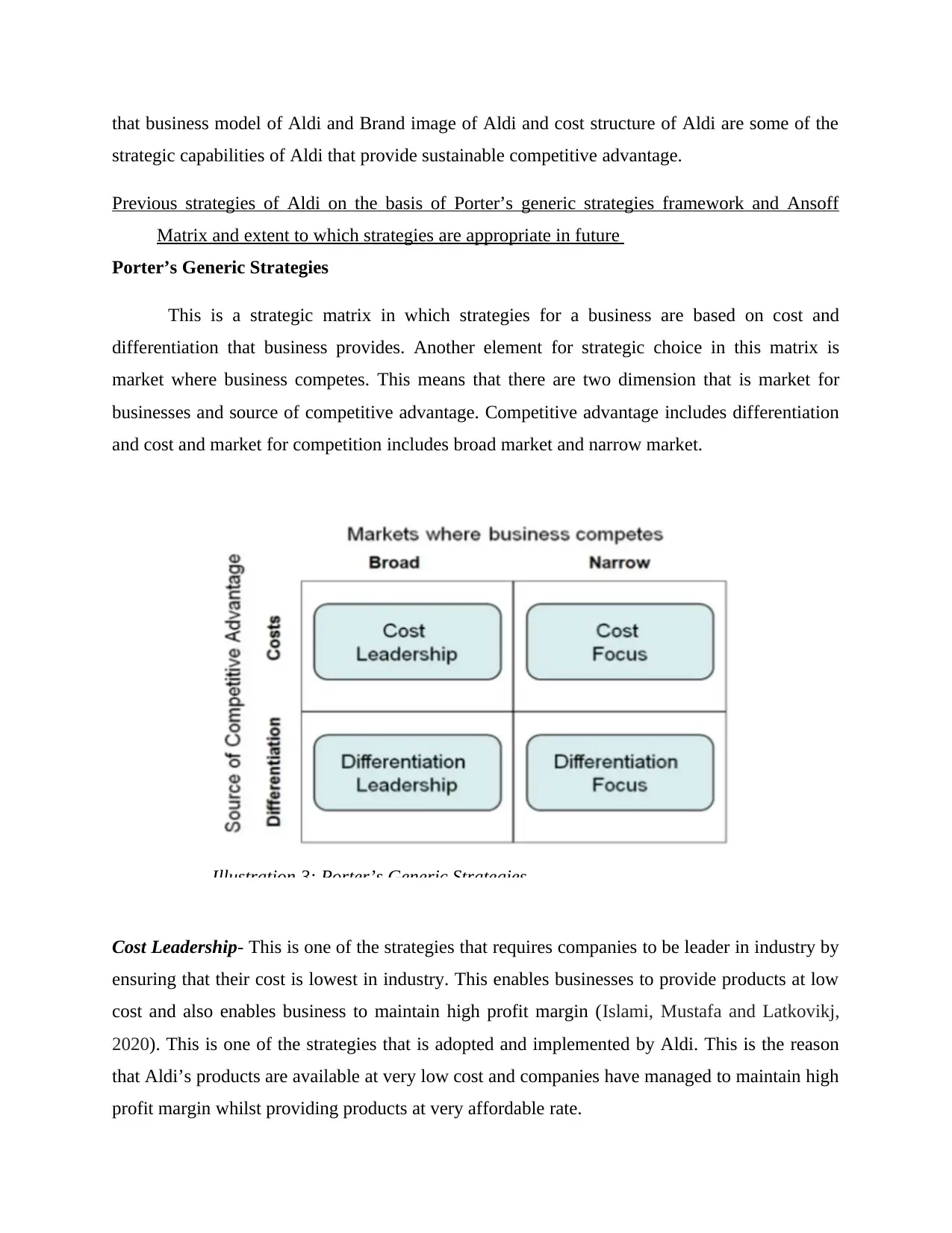
that business model of Aldi and Brand image of Aldi and cost structure of Aldi are some of the
strategic capabilities of Aldi that provide sustainable competitive advantage.
Previous strategies of Aldi on the basis of Porter’s generic strategies framework and Ansoff
Matrix and extent to which strategies are appropriate in future
Porter’s Generic Strategies
This is a strategic matrix in which strategies for a business are based on cost and
differentiation that business provides. Another element for strategic choice in this matrix is
market where business competes. This means that there are two dimension that is market for
businesses and source of competitive advantage. Competitive advantage includes differentiation
and cost and market for competition includes broad market and narrow market.
Cost Leadership- This is one of the strategies that requires companies to be leader in industry by
ensuring that their cost is lowest in industry. This enables businesses to provide products at low
cost and also enables business to maintain high profit margin (Islami, Mustafa and Latkovikj,
2020). This is one of the strategies that is adopted and implemented by Aldi. This is the reason
that Aldi’s products are available at very low cost and companies have managed to maintain high
profit margin whilst providing products at very affordable rate.
Illustration 3: Porter’s Generic Strategies
strategic capabilities of Aldi that provide sustainable competitive advantage.
Previous strategies of Aldi on the basis of Porter’s generic strategies framework and Ansoff
Matrix and extent to which strategies are appropriate in future
Porter’s Generic Strategies
This is a strategic matrix in which strategies for a business are based on cost and
differentiation that business provides. Another element for strategic choice in this matrix is
market where business competes. This means that there are two dimension that is market for
businesses and source of competitive advantage. Competitive advantage includes differentiation
and cost and market for competition includes broad market and narrow market.
Cost Leadership- This is one of the strategies that requires companies to be leader in industry by
ensuring that their cost is lowest in industry. This enables businesses to provide products at low
cost and also enables business to maintain high profit margin (Islami, Mustafa and Latkovikj,
2020). This is one of the strategies that is adopted and implemented by Aldi. This is the reason
that Aldi’s products are available at very low cost and companies have managed to maintain high
profit margin whilst providing products at very affordable rate.
Illustration 3: Porter’s Generic Strategies
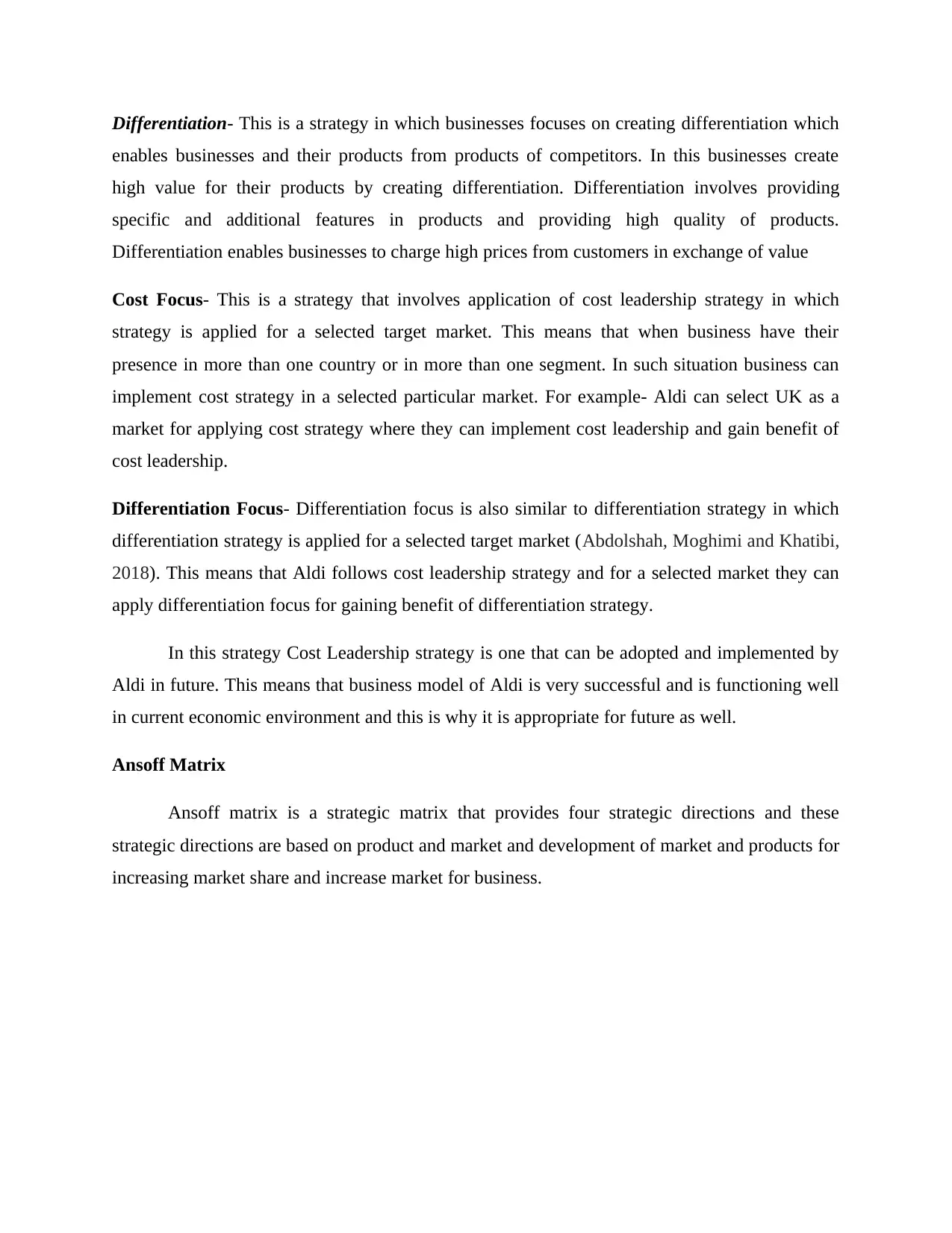
Differentiation- This is a strategy in which businesses focuses on creating differentiation which
enables businesses and their products from products of competitors. In this businesses create
high value for their products by creating differentiation. Differentiation involves providing
specific and additional features in products and providing high quality of products.
Differentiation enables businesses to charge high prices from customers in exchange of value
Cost Focus- This is a strategy that involves application of cost leadership strategy in which
strategy is applied for a selected target market. This means that when business have their
presence in more than one country or in more than one segment. In such situation business can
implement cost strategy in a selected particular market. For example- Aldi can select UK as a
market for applying cost strategy where they can implement cost leadership and gain benefit of
cost leadership.
Differentiation Focus- Differentiation focus is also similar to differentiation strategy in which
differentiation strategy is applied for a selected target market (Abdolshah, Moghimi and Khatibi,
2018). This means that Aldi follows cost leadership strategy and for a selected market they can
apply differentiation focus for gaining benefit of differentiation strategy.
In this strategy Cost Leadership strategy is one that can be adopted and implemented by
Aldi in future. This means that business model of Aldi is very successful and is functioning well
in current economic environment and this is why it is appropriate for future as well.
Ansoff Matrix
Ansoff matrix is a strategic matrix that provides four strategic directions and these
strategic directions are based on product and market and development of market and products for
increasing market share and increase market for business.
enables businesses and their products from products of competitors. In this businesses create
high value for their products by creating differentiation. Differentiation involves providing
specific and additional features in products and providing high quality of products.
Differentiation enables businesses to charge high prices from customers in exchange of value
Cost Focus- This is a strategy that involves application of cost leadership strategy in which
strategy is applied for a selected target market. This means that when business have their
presence in more than one country or in more than one segment. In such situation business can
implement cost strategy in a selected particular market. For example- Aldi can select UK as a
market for applying cost strategy where they can implement cost leadership and gain benefit of
cost leadership.
Differentiation Focus- Differentiation focus is also similar to differentiation strategy in which
differentiation strategy is applied for a selected target market (Abdolshah, Moghimi and Khatibi,
2018). This means that Aldi follows cost leadership strategy and for a selected market they can
apply differentiation focus for gaining benefit of differentiation strategy.
In this strategy Cost Leadership strategy is one that can be adopted and implemented by
Aldi in future. This means that business model of Aldi is very successful and is functioning well
in current economic environment and this is why it is appropriate for future as well.
Ansoff Matrix
Ansoff matrix is a strategic matrix that provides four strategic directions and these
strategic directions are based on product and market and development of market and products for
increasing market share and increase market for business.
Paraphrase This Document
Need a fresh take? Get an instant paraphrase of this document with our AI Paraphraser
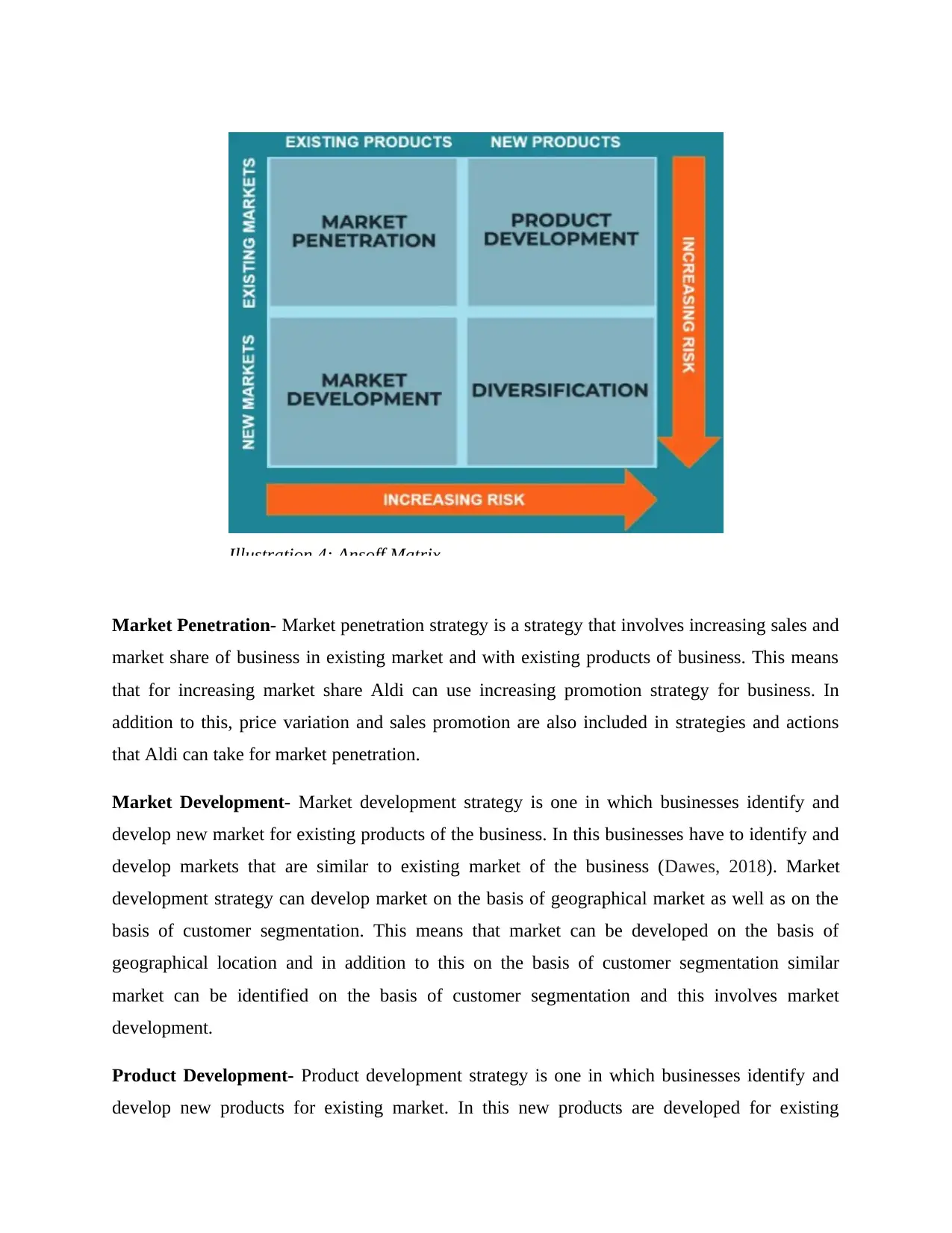
Market Penetration- Market penetration strategy is a strategy that involves increasing sales and
market share of business in existing market and with existing products of business. This means
that for increasing market share Aldi can use increasing promotion strategy for business. In
addition to this, price variation and sales promotion are also included in strategies and actions
that Aldi can take for market penetration.
Market Development- Market development strategy is one in which businesses identify and
develop new market for existing products of the business. In this businesses have to identify and
develop markets that are similar to existing market of the business (Dawes, 2018). Market
development strategy can develop market on the basis of geographical market as well as on the
basis of customer segmentation. This means that market can be developed on the basis of
geographical location and in addition to this on the basis of customer segmentation similar
market can be identified on the basis of customer segmentation and this involves market
development.
Product Development- Product development strategy is one in which businesses identify and
develop new products for existing market. In this new products are developed for existing
Illustration 4: Ansoff Matrix
market share of business in existing market and with existing products of business. This means
that for increasing market share Aldi can use increasing promotion strategy for business. In
addition to this, price variation and sales promotion are also included in strategies and actions
that Aldi can take for market penetration.
Market Development- Market development strategy is one in which businesses identify and
develop new market for existing products of the business. In this businesses have to identify and
develop markets that are similar to existing market of the business (Dawes, 2018). Market
development strategy can develop market on the basis of geographical market as well as on the
basis of customer segmentation. This means that market can be developed on the basis of
geographical location and in addition to this on the basis of customer segmentation similar
market can be identified on the basis of customer segmentation and this involves market
development.
Product Development- Product development strategy is one in which businesses identify and
develop new products for existing market. In this new products are developed for existing
Illustration 4: Ansoff Matrix
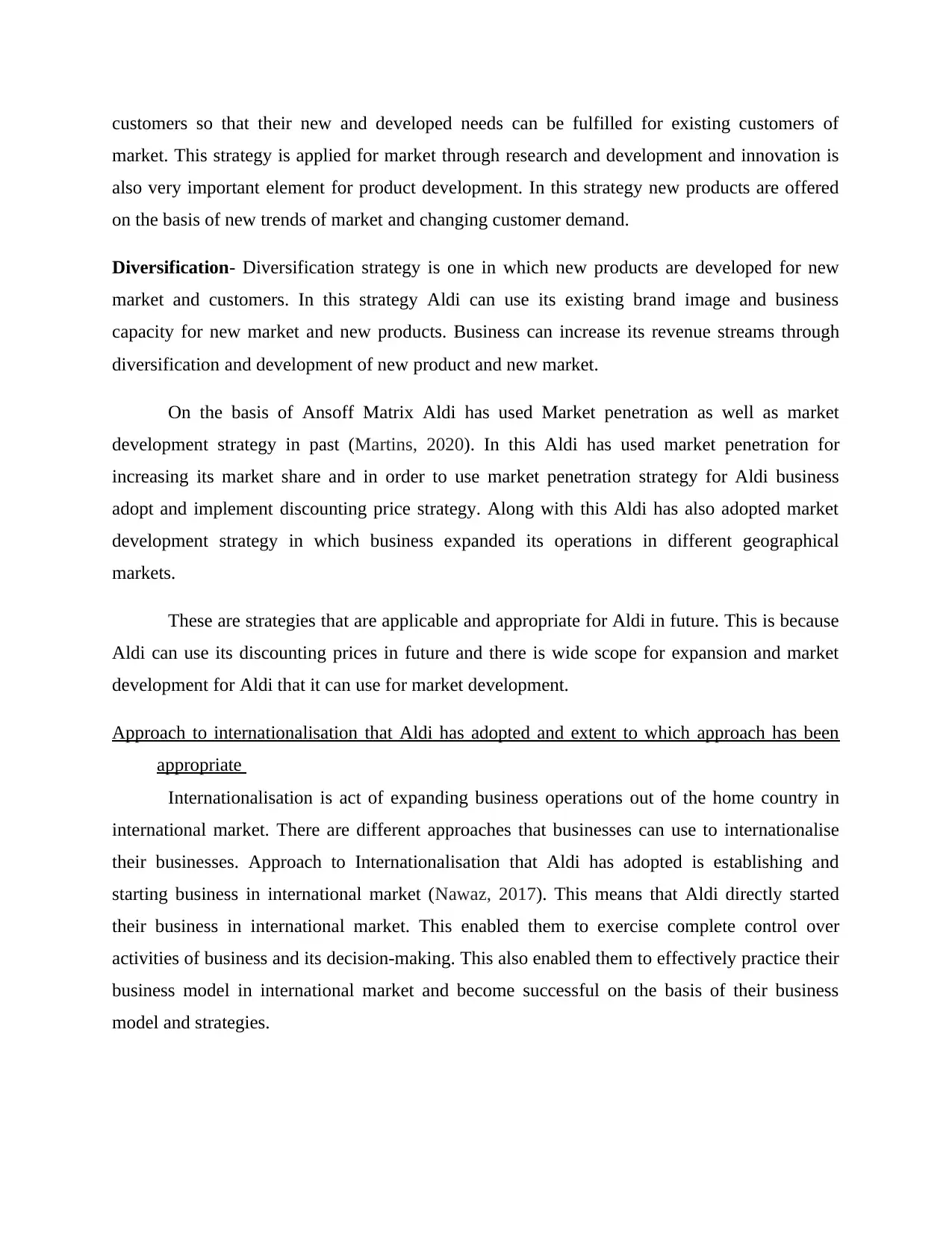
customers so that their new and developed needs can be fulfilled for existing customers of
market. This strategy is applied for market through research and development and innovation is
also very important element for product development. In this strategy new products are offered
on the basis of new trends of market and changing customer demand.
Diversification- Diversification strategy is one in which new products are developed for new
market and customers. In this strategy Aldi can use its existing brand image and business
capacity for new market and new products. Business can increase its revenue streams through
diversification and development of new product and new market.
On the basis of Ansoff Matrix Aldi has used Market penetration as well as market
development strategy in past (Martins, 2020). In this Aldi has used market penetration for
increasing its market share and in order to use market penetration strategy for Aldi business
adopt and implement discounting price strategy. Along with this Aldi has also adopted market
development strategy in which business expanded its operations in different geographical
markets.
These are strategies that are applicable and appropriate for Aldi in future. This is because
Aldi can use its discounting prices in future and there is wide scope for expansion and market
development for Aldi that it can use for market development.
Approach to internationalisation that Aldi has adopted and extent to which approach has been
appropriate
Internationalisation is act of expanding business operations out of the home country in
international market. There are different approaches that businesses can use to internationalise
their businesses. Approach to Internationalisation that Aldi has adopted is establishing and
starting business in international market (Nawaz, 2017). This means that Aldi directly started
their business in international market. This enabled them to exercise complete control over
activities of business and its decision-making. This also enabled them to effectively practice their
business model in international market and become successful on the basis of their business
model and strategies.
market. This strategy is applied for market through research and development and innovation is
also very important element for product development. In this strategy new products are offered
on the basis of new trends of market and changing customer demand.
Diversification- Diversification strategy is one in which new products are developed for new
market and customers. In this strategy Aldi can use its existing brand image and business
capacity for new market and new products. Business can increase its revenue streams through
diversification and development of new product and new market.
On the basis of Ansoff Matrix Aldi has used Market penetration as well as market
development strategy in past (Martins, 2020). In this Aldi has used market penetration for
increasing its market share and in order to use market penetration strategy for Aldi business
adopt and implement discounting price strategy. Along with this Aldi has also adopted market
development strategy in which business expanded its operations in different geographical
markets.
These are strategies that are applicable and appropriate for Aldi in future. This is because
Aldi can use its discounting prices in future and there is wide scope for expansion and market
development for Aldi that it can use for market development.
Approach to internationalisation that Aldi has adopted and extent to which approach has been
appropriate
Internationalisation is act of expanding business operations out of the home country in
international market. There are different approaches that businesses can use to internationalise
their businesses. Approach to Internationalisation that Aldi has adopted is establishing and
starting business in international market (Nawaz, 2017). This means that Aldi directly started
their business in international market. This enabled them to exercise complete control over
activities of business and its decision-making. This also enabled them to effectively practice their
business model in international market and become successful on the basis of their business
model and strategies.
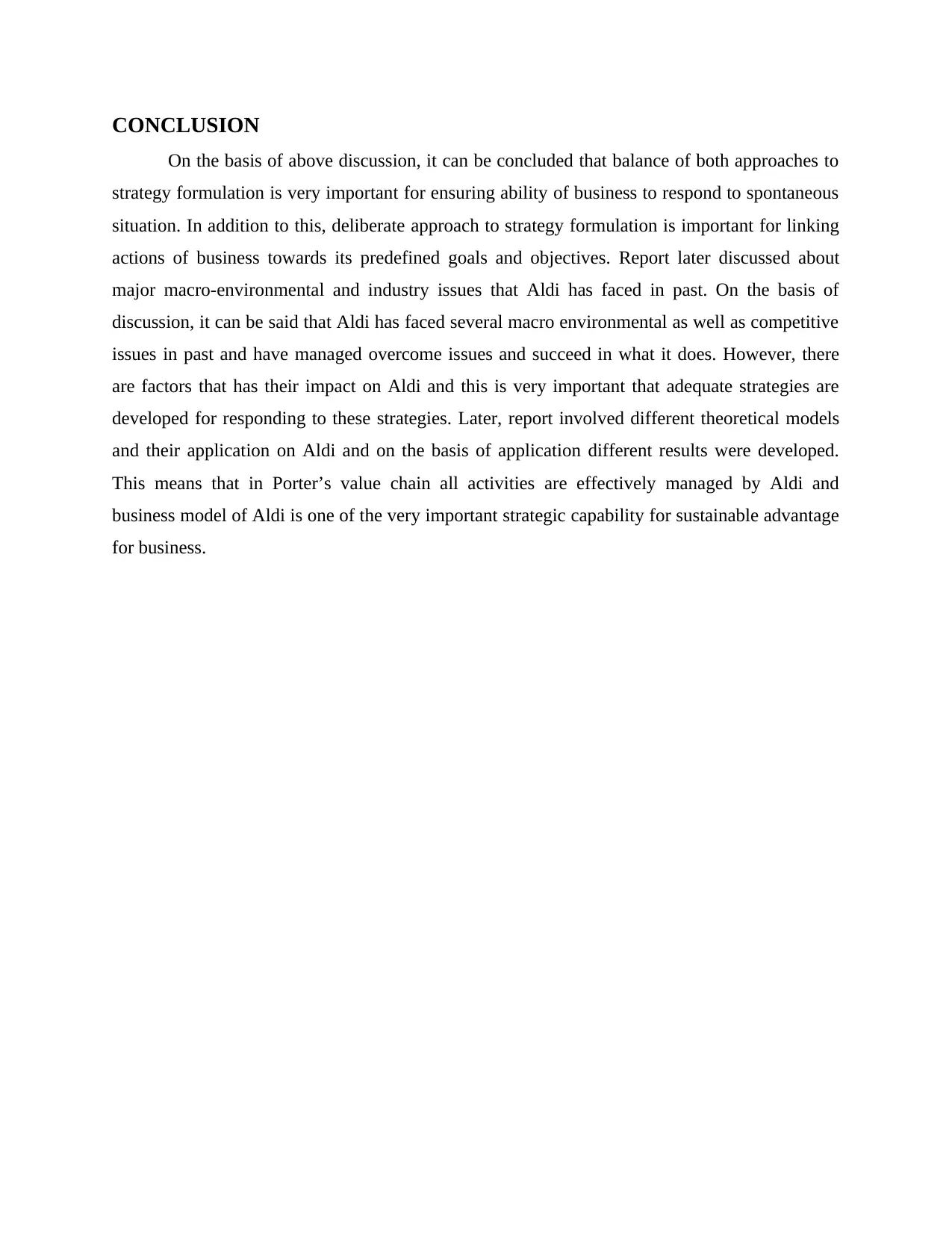
CONCLUSION
On the basis of above discussion, it can be concluded that balance of both approaches to
strategy formulation is very important for ensuring ability of business to respond to spontaneous
situation. In addition to this, deliberate approach to strategy formulation is important for linking
actions of business towards its predefined goals and objectives. Report later discussed about
major macro-environmental and industry issues that Aldi has faced in past. On the basis of
discussion, it can be said that Aldi has faced several macro environmental as well as competitive
issues in past and have managed overcome issues and succeed in what it does. However, there
are factors that has their impact on Aldi and this is very important that adequate strategies are
developed for responding to these strategies. Later, report involved different theoretical models
and their application on Aldi and on the basis of application different results were developed.
This means that in Porter’s value chain all activities are effectively managed by Aldi and
business model of Aldi is one of the very important strategic capability for sustainable advantage
for business.
On the basis of above discussion, it can be concluded that balance of both approaches to
strategy formulation is very important for ensuring ability of business to respond to spontaneous
situation. In addition to this, deliberate approach to strategy formulation is important for linking
actions of business towards its predefined goals and objectives. Report later discussed about
major macro-environmental and industry issues that Aldi has faced in past. On the basis of
discussion, it can be said that Aldi has faced several macro environmental as well as competitive
issues in past and have managed overcome issues and succeed in what it does. However, there
are factors that has their impact on Aldi and this is very important that adequate strategies are
developed for responding to these strategies. Later, report involved different theoretical models
and their application on Aldi and on the basis of application different results were developed.
This means that in Porter’s value chain all activities are effectively managed by Aldi and
business model of Aldi is one of the very important strategic capability for sustainable advantage
for business.
Secure Best Marks with AI Grader
Need help grading? Try our AI Grader for instant feedback on your assignments.
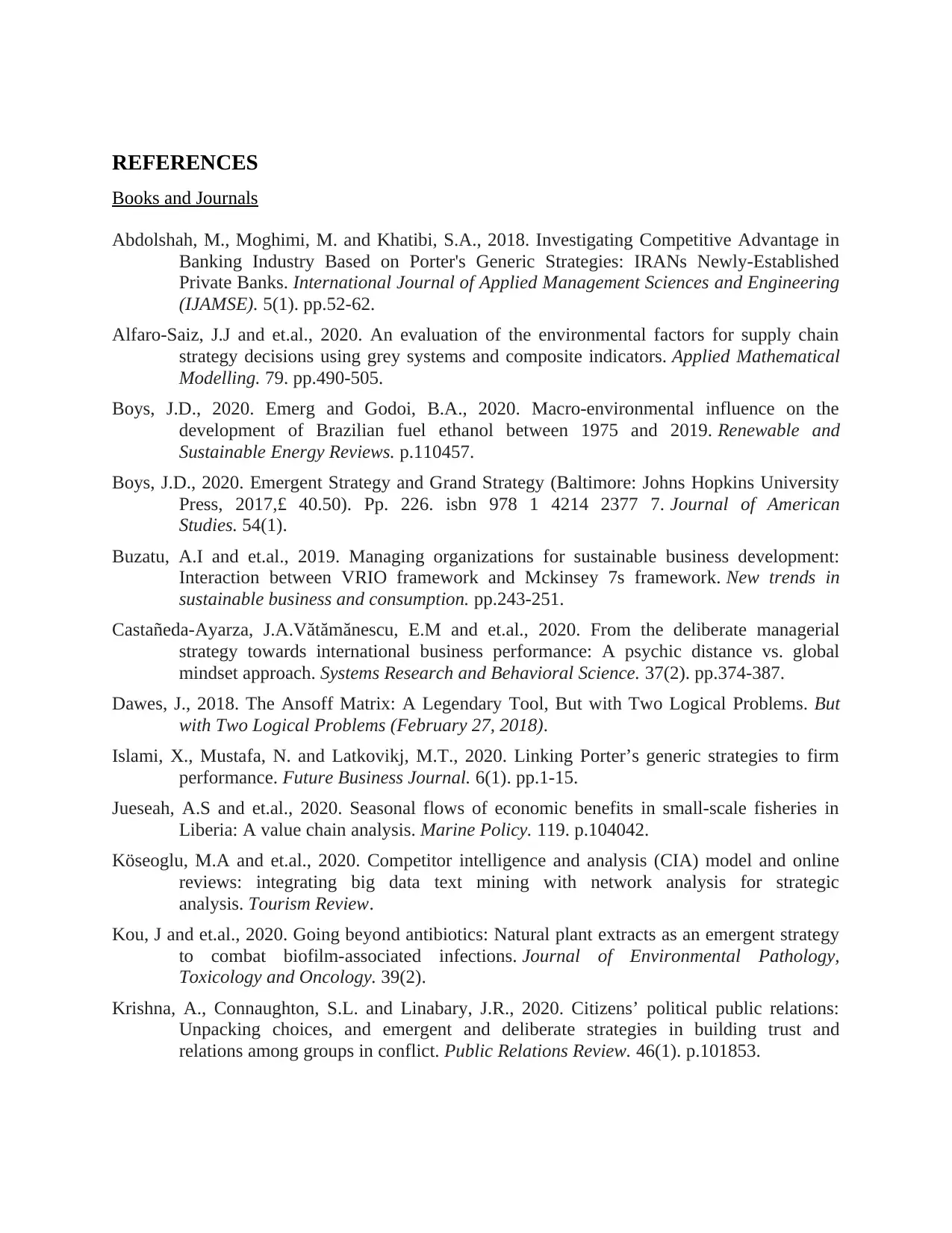
REFERENCES
Books and Journals
Abdolshah, M., Moghimi, M. and Khatibi, S.A., 2018. Investigating Competitive Advantage in
Banking Industry Based on Porter's Generic Strategies: IRANs Newly-Established
Private Banks. International Journal of Applied Management Sciences and Engineering
(IJAMSE). 5(1). pp.52-62.
Alfaro-Saiz, J.J and et.al., 2020. An evaluation of the environmental factors for supply chain
strategy decisions using grey systems and composite indicators. Applied Mathematical
Modelling. 79. pp.490-505.
Boys, J.D., 2020. Emerg and Godoi, B.A., 2020. Macro-environmental influence on the
development of Brazilian fuel ethanol between 1975 and 2019. Renewable and
Sustainable Energy Reviews. p.110457.
Boys, J.D., 2020. Emergent Strategy and Grand Strategy (Baltimore: Johns Hopkins University
Press, 2017,£ 40.50). Pp. 226. isbn 978 1 4214 2377 7. Journal of American
Studies. 54(1).
Buzatu, A.I and et.al., 2019. Managing organizations for sustainable business development:
Interaction between VRIO framework and Mckinsey 7s framework. New trends in
sustainable business and consumption. pp.243-251.
Castañeda-Ayarza, J.A.Vătămănescu, E.M and et.al., 2020. From the deliberate managerial
strategy towards international business performance: A psychic distance vs. global
mindset approach. Systems Research and Behavioral Science. 37(2). pp.374-387.
Dawes, J., 2018. The Ansoff Matrix: A Legendary Tool, But with Two Logical Problems. But
with Two Logical Problems (February 27, 2018).
Islami, X., Mustafa, N. and Latkovikj, M.T., 2020. Linking Porter’s generic strategies to firm
performance. Future Business Journal. 6(1). pp.1-15.
Jueseah, A.S and et.al., 2020. Seasonal flows of economic benefits in small-scale fisheries in
Liberia: A value chain analysis. Marine Policy. 119. p.104042.
Köseoglu, M.A and et.al., 2020. Competitor intelligence and analysis (CIA) model and online
reviews: integrating big data text mining with network analysis for strategic
analysis. Tourism Review.
Kou, J and et.al., 2020. Going beyond antibiotics: Natural plant extracts as an emergent strategy
to combat biofilm-associated infections. Journal of Environmental Pathology,
Toxicology and Oncology. 39(2).
Krishna, A., Connaughton, S.L. and Linabary, J.R., 2020. Citizens’ political public relations:
Unpacking choices, and emergent and deliberate strategies in building trust and
relations among groups in conflict. Public Relations Review. 46(1). p.101853.
Books and Journals
Abdolshah, M., Moghimi, M. and Khatibi, S.A., 2018. Investigating Competitive Advantage in
Banking Industry Based on Porter's Generic Strategies: IRANs Newly-Established
Private Banks. International Journal of Applied Management Sciences and Engineering
(IJAMSE). 5(1). pp.52-62.
Alfaro-Saiz, J.J and et.al., 2020. An evaluation of the environmental factors for supply chain
strategy decisions using grey systems and composite indicators. Applied Mathematical
Modelling. 79. pp.490-505.
Boys, J.D., 2020. Emerg and Godoi, B.A., 2020. Macro-environmental influence on the
development of Brazilian fuel ethanol between 1975 and 2019. Renewable and
Sustainable Energy Reviews. p.110457.
Boys, J.D., 2020. Emergent Strategy and Grand Strategy (Baltimore: Johns Hopkins University
Press, 2017,£ 40.50). Pp. 226. isbn 978 1 4214 2377 7. Journal of American
Studies. 54(1).
Buzatu, A.I and et.al., 2019. Managing organizations for sustainable business development:
Interaction between VRIO framework and Mckinsey 7s framework. New trends in
sustainable business and consumption. pp.243-251.
Castañeda-Ayarza, J.A.Vătămănescu, E.M and et.al., 2020. From the deliberate managerial
strategy towards international business performance: A psychic distance vs. global
mindset approach. Systems Research and Behavioral Science. 37(2). pp.374-387.
Dawes, J., 2018. The Ansoff Matrix: A Legendary Tool, But with Two Logical Problems. But
with Two Logical Problems (February 27, 2018).
Islami, X., Mustafa, N. and Latkovikj, M.T., 2020. Linking Porter’s generic strategies to firm
performance. Future Business Journal. 6(1). pp.1-15.
Jueseah, A.S and et.al., 2020. Seasonal flows of economic benefits in small-scale fisheries in
Liberia: A value chain analysis. Marine Policy. 119. p.104042.
Köseoglu, M.A and et.al., 2020. Competitor intelligence and analysis (CIA) model and online
reviews: integrating big data text mining with network analysis for strategic
analysis. Tourism Review.
Kou, J and et.al., 2020. Going beyond antibiotics: Natural plant extracts as an emergent strategy
to combat biofilm-associated infections. Journal of Environmental Pathology,
Toxicology and Oncology. 39(2).
Krishna, A., Connaughton, S.L. and Linabary, J.R., 2020. Citizens’ political public relations:
Unpacking choices, and emergent and deliberate strategies in building trust and
relations among groups in conflict. Public Relations Review. 46(1). p.101853.
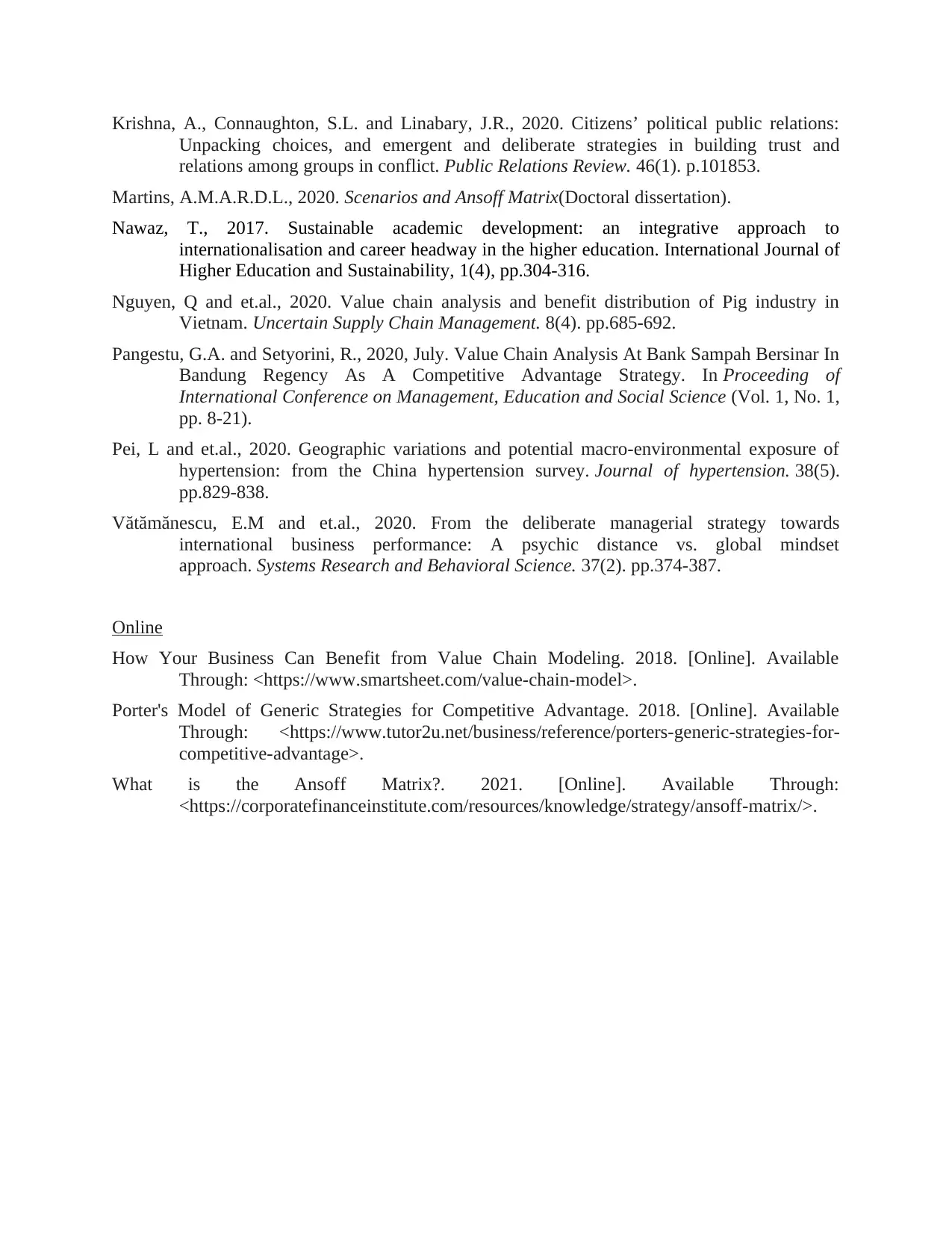
Krishna, A., Connaughton, S.L. and Linabary, J.R., 2020. Citizens’ political public relations:
Unpacking choices, and emergent and deliberate strategies in building trust and
relations among groups in conflict. Public Relations Review. 46(1). p.101853.
Martins, A.M.A.R.D.L., 2020. Scenarios and Ansoff Matrix(Doctoral dissertation).
Nawaz, T., 2017. Sustainable academic development: an integrative approach to
internationalisation and career headway in the higher education. International Journal of
Higher Education and Sustainability, 1(4), pp.304-316.
Nguyen, Q and et.al., 2020. Value chain analysis and benefit distribution of Pig industry in
Vietnam. Uncertain Supply Chain Management. 8(4). pp.685-692.
Pangestu, G.A. and Setyorini, R., 2020, July. Value Chain Analysis At Bank Sampah Bersinar In
Bandung Regency As A Competitive Advantage Strategy. In Proceeding of
International Conference on Management, Education and Social Science (Vol. 1, No. 1,
pp. 8-21).
Pei, L and et.al., 2020. Geographic variations and potential macro-environmental exposure of
hypertension: from the China hypertension survey. Journal of hypertension. 38(5).
pp.829-838.
Vătămănescu, E.M and et.al., 2020. From the deliberate managerial strategy towards
international business performance: A psychic distance vs. global mindset
approach. Systems Research and Behavioral Science. 37(2). pp.374-387.
Online
How Your Business Can Benefit from Value Chain Modeling. 2018. [Online]. Available
Through: <https://www.smartsheet.com/value-chain-model>.
Porter's Model of Generic Strategies for Competitive Advantage. 2018. [Online]. Available
Through: <https://www.tutor2u.net/business/reference/porters-generic-strategies-for-
competitive-advantage>.
What is the Ansoff Matrix?. 2021. [Online]. Available Through:
<https://corporatefinanceinstitute.com/resources/knowledge/strategy/ansoff-matrix/>.
Unpacking choices, and emergent and deliberate strategies in building trust and
relations among groups in conflict. Public Relations Review. 46(1). p.101853.
Martins, A.M.A.R.D.L., 2020. Scenarios and Ansoff Matrix(Doctoral dissertation).
Nawaz, T., 2017. Sustainable academic development: an integrative approach to
internationalisation and career headway in the higher education. International Journal of
Higher Education and Sustainability, 1(4), pp.304-316.
Nguyen, Q and et.al., 2020. Value chain analysis and benefit distribution of Pig industry in
Vietnam. Uncertain Supply Chain Management. 8(4). pp.685-692.
Pangestu, G.A. and Setyorini, R., 2020, July. Value Chain Analysis At Bank Sampah Bersinar In
Bandung Regency As A Competitive Advantage Strategy. In Proceeding of
International Conference on Management, Education and Social Science (Vol. 1, No. 1,
pp. 8-21).
Pei, L and et.al., 2020. Geographic variations and potential macro-environmental exposure of
hypertension: from the China hypertension survey. Journal of hypertension. 38(5).
pp.829-838.
Vătămănescu, E.M and et.al., 2020. From the deliberate managerial strategy towards
international business performance: A psychic distance vs. global mindset
approach. Systems Research and Behavioral Science. 37(2). pp.374-387.
Online
How Your Business Can Benefit from Value Chain Modeling. 2018. [Online]. Available
Through: <https://www.smartsheet.com/value-chain-model>.
Porter's Model of Generic Strategies for Competitive Advantage. 2018. [Online]. Available
Through: <https://www.tutor2u.net/business/reference/porters-generic-strategies-for-
competitive-advantage>.
What is the Ansoff Matrix?. 2021. [Online]. Available Through:
<https://corporatefinanceinstitute.com/resources/knowledge/strategy/ansoff-matrix/>.
1 out of 18
Related Documents
Your All-in-One AI-Powered Toolkit for Academic Success.
+13062052269
info@desklib.com
Available 24*7 on WhatsApp / Email
![[object Object]](/_next/static/media/star-bottom.7253800d.svg)
Unlock your academic potential
© 2024 | Zucol Services PVT LTD | All rights reserved.





